#if persona’s all about wish fulfillment where’s my persona game where i can be a feminist huh
Text
persona misogyny is so fucking wild. ignoring literally everything else about the entire rest of the games, every single s.link with a female character is like “entirely for having been born a woman i have had to work twice as hard for a fraction of the benefit. even now, i am stripped of my agency in a position i never wanted in the first place” and/or “i’m put on a pedestal by the people in my life because of my looks. men see me as an object to be conquered, women hate me for ‘stealing’ ‘their’ men. if i’m withdrawn i’m a bitch, if i’m friendly i’m easy. because of this, i’m alone” and/or “because of my personality or hobby or lack of cooking skills, i feel like i’m failing at femininity. if being a woman is something i can fail at, then where does that leave me? i’m scared at the loss of my identity and place in society”
like very consistently they present female characters with complex thoughts towards their place in society as women, femininity as a whole, and facing issues stemming from misogyny, and then the payoff is always “my problems were entirely my own fault. i wasn’t strong enough, i was a coward. but now, i’m gonna work hard to be exactly what society expects me to be (which is what i want to be)! i’m gonna do better at femininity (which is still something tangible i can fail at)! i’m going to try hard at making friends (which was my fault for not doing)! all my problems are solved through personal responsibility (that im totally culpable for), effort (which i previously was not putting in), or you, a man! i am Happy and Satisfied with this outcome, can i be Your woman?”
and like hello? why are we here. what the fuck are we doing. why do we keep doing this every single time. can we not do the constant lukewarm attempts at criticizing misogyny so you can jerk off to your own thoughtfulness, while ultimately reinforcing patriarchal systems and brushing off any deeper misogyny-bred issues as a lack of deference to one’s rightful place in society? like maybe don’t do that? for fucking once? just an idea
#i’d really need to rewatch slinks to give more indepth thoughts or pull specific examples#but i’m right and i pace about it every day#i’m not really talking about naoto that’s a whole other can of worms a long way down the line#rambles#if persona’s all about wish fulfillment where’s my persona game where i can be a feminist huh#p4g posting#p3p posting#yeah both of those. i’m not far enough in p4 to have seen the payoff but i know that its fucking persona 4#and jesus christ yukiko!! i only vaguely know of ai. chie in the main story/dialogue options you have#jesus christ the dialogue options. can you ask literally every girl if they have a boyfriend?? and ‘thats very feminine’ DIE#and man p3p. persona main plot misogyny is weird when you’re on the other side of it#it’s a very different experience being the one getting peeped on#and then saori. and mitsuru. and fuuka. kinda rio. idr a single thing about yukari’s slink i’m sorry but probably her too#also my vague recollection of p5 with haru. ann by default though idr her slink#and goddd of course the. everything else. i’m not touching on. main plot misogyny and inherent writing stuff and etc etc etc etc etc etc et#GOD.#persona is hell
359 notes
·
View notes
Text
it’s all been said before but the whole pronouns thing for some people is getting so ridiculous it’s honestly just sad
#just saw a TIF post ‘i’ve decided that in addition to he/they i am now interested in ‘he/they/she. but just as a spicy little extra#only on rare occasion for fun. but please don’t ONLY use she/her for me if you use that please switch it up from time to time!’#like girl can’t you see how meaningless this all is. it’s a consumerist hobby to you it’s a game of playing with masks for fun#it’s literally just about playing pretend and getting excited when your friends play along. it’s a bit#but actors get uncomfortable when the topic lingers on the truth for too long. they’re cool with dancing around it sometimes#but they don’t like being unmasked openly because they don’t like their true selves they like having a persona#this whole trans thing is so insanely dangerous people are straight up encouraging personality disorder type behavior#or like. when people who ‘use multiple pronoun sets’ post stuff like ‘i wish people would actually bother to switch it up sometimes#or use he or she instead of always just they :/‘ like yeah people are avoiding saying anything real because they’re afraid of upsetting you#and catching you on a bad day where that’s not right#or like. they’d prefer a consistent approach to language at the very least instead of fulfilling your ever-changing fantasies#because you can’t make up your mind because you always need more and more attention and can’t just be satisfied with yourself#literally i can remember my own experience with this thing wasn’t ‘maybe i’m actually not a girl’ (this is almost never it)#it was ‘maybe it would be fun to go she/they and put a non-binary flag in my icon and reblog all these cool posts about being trans’#’it looks like it would be a lot of fun to get in on this cool thing and be someone special and have a secret identity in real life’#it is so much fun to play pretend. and it is so damaging to act like these intrusive thoughts actually mean anything about your gender#bc when you spend too much time on the internet and start entertaining the idea of being someone else#it starts to feel weird when people irl refer to you as who you are with all relevant gendered language#dysphoria is being manufactured by overthinking about things while having ideas flow into your mind by a constant social media stream#for a whole generation of people online it is almost never an actual natural thing
5 notes
·
View notes
Text
[3.8] Technology as a False God: On "Evolution," the Duality of Machines, Replication, and Wisdom
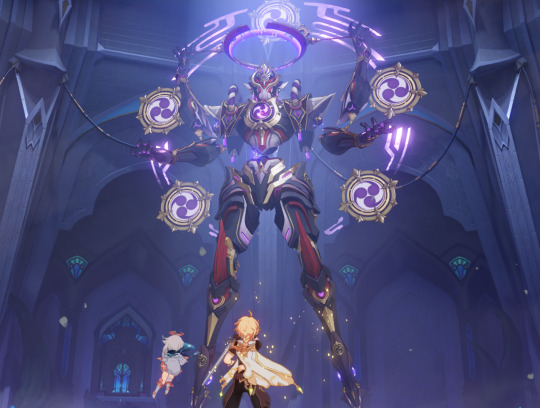
“To recognize untruth as a condition of life: that is certainly to impugn the traditional ideas of value in a dangerous manner, and a philosophy which ventures to do so, has thereby alone placed itself beyond good and evil.” –Friedrich Nietzsche, Beyond Good and Evil
Before we move on to the nation of justice, I want to do one last inquiry into the narrative significance of machines and technology in Genshin’s 3.x patch cycle. Here, I’ll discuss how divinity (or “godhood”) and technology are treated as interchangeable tools to surpass fate and the boundaries of mortality, the potential problems with treating them this way, and propose an alternative relationship between humanity and technology as illustrated through Karkata, Benben, Tamimi, and Mehrak. By foregrounding machines, we learn something intriguing about ourselves and the “truth” of this world as we perceive it.
SPOILERS: All Sumeru Archon Quests, Caribert, the Golden Slumber and one out-of-context screenshot from Dual Evidence, the Dirge of Bilqis and its post-quests, Khvarena of Good and Evil, Nahida’s second Story Quest, Faruzan’s hangout, an out-of-context screenshot from Baizhu’s Story Quest, and major spoilers for Persona 5 strikers at the end. Also some dialogue from Shadows Amidst Snowstorms and A Parade of Providence, two limited-time events from 2.3 and 3.6 respectively.
Disclaimer: I have tried my best to write this post so that it stands on its own, but because it is still a sequel it will probably make the most sense with the context of part 1. Here are the previous posts leading up to this one:
Part 0: On Dreams, the Abyss, Forbidden Knowledge, and Wish Fulfillment
Part 1: The Uncanny, Fate and the Machine
Terminology:
Machine is sometimes used interchangeably with “technology” in this post.
Technology or tool here is referring to technologies specifically used to pursue a wish like immortality in the face of existential dread, not the use of technology or medicine (which I do not address here, and is very difficult to separate from the former) to facilitate someone’s life who could otherwise not survive without that technology, or would have a more painful lived experience without it.
Also, though I don’t engage directly with “A Cyborg Manifesto” here, Donna Haraway’s ideas have greatly influenced my own over the years since I read her in college (although I mostly disagree with her on many points, or at least don’t go as far in boundary deconstruction as she does). I owe my interest in technology studies to her and that piece. Her essay is linked here and at the bottom if you would like to read it.
(and finally with many, many, many thanks to my boyfriend for multiple beta reads despite not having played a single Hoyoverse game, helping me work out the philosophy bits and contextualizing them in history, and encouraging me to finish this)
TL;DR: Machines are friends, not food!
No Matter the Cost
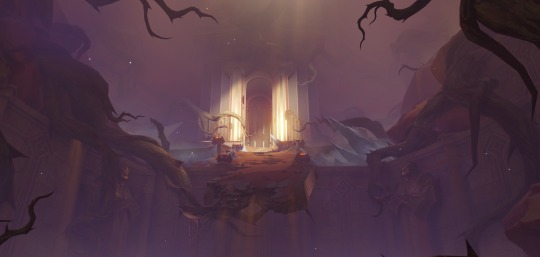
“...Perhaps it is as the notebook says, and we can find a power that transcends even that of the Abyss — the power of ‘evolution’...” -Records of Unknown Attribution (I)
“Life, death... and the world around us all follow a set of laws... Hehe, but if you never test the limits, how can anyone know where the boundaries of these laws are?” -Baizhu Voicelines, Chat: Natural Laws
“...Even the ominous thing that came down from the heavens shall be ours to use…” -Hyglacg, Shadowy Husk in the Chasm
Without a doubt, the star of this patch cycle is Khaenri’ah, which lurked in subtext and allegory in the Archon Quest, haunted Sumeru’s landscape with its massive defunct Ruin Golems, and finally smacked us in the face with its physical location in Khvarena of Good and Evil..
We already know that Khaenri’ah was a nation that put its faith not in the gods but rather in human ingenuity and technology, and that they ultimately attained a power so great that they “almost touched the dome of the firmament.” They did this by researching increasingly dangerous energy sources for their numerous mechanical creations, the Ruin Machines we are all too familiar with by now. They started out with Azosite, a Ley Line-based elemental energy source that powered their earliest Ruin Guard models, like those scattered around Devantaka Mountain.

Nasejuna: This giant furnace is used to make a substance known as Azosite. It is the core of this entire factory, and the Energy Blocks we saw earlier were derived from this place.
But this energy source proved inefficient and therefore inadequate for Khaenri’ah’s goals, which led them to seek a higher power from beyond the skies that could fuel their larger machines with perpetual energy. This likely is the bridge between Khaenri’ah’s fate and Chlothar’s mysterious remarks in Caribert about the Abyss Sibling:
Chlothar: We once believed that you would bring new strength and hope to Khaenri'ah.
Chlothar: To us, you were the Abyss... A wondrous mystery far beyond our imagination and comprehension...
Chlothar: ...And the one who controls the Abyss can control everything!
Chlothar: We yearned for that future. We looked to you to take us there.
Chlothar: But what did you bring us instead?
Though Khaenri’ah presents itself proudly as a godless nation, it may have been founded around the time when the celestial nails dropped in Teyvat’s first forbidden knowledge pollution event, which destroyed the unified human civilization. As potential survivors of this devastating act by the Primordial One, Khaenri’ahns then settled in a lifeless land without plants or animals of its own, and they hoped to build something there that belonged solely to humanity. The Heavenly Principles had turned on the world’s earliest humans, and they were powerless against them. Chlothar’s words betray the scars of this trauma on Khaenri’ah, as well as their desperation to control their fate by looking to the Abyss.
As a brief refresher from the previous part, we discussed how the German word heimlich denotes “the home,” all that is familiar and known, while unheimlich (uncanny) refers to all that is unfamiliar and external to the home, such as the wilderness. The Abyss sibling and the Traveler are external variables to Teyvat, making them otherworldly, unfamiliar entities full of potential to surpass Teyvat’s natural laws. Although the Abyss sibling is not a god per se, they were probably as close to a god as Khaenri’ah ever had, because to them the sibling embodied the higher power they were searching for, and they saw that “godliness,” a sort of functional divinity, was yet another technology for them to master. In this way, the Abyss sibling (and their functional divinity) was a powerful tool for Khaenri’ah’s desired end, the “future they yearned for,” a being who could deliver them to the end of their suffering under the Heavenly Principles.
It’s similar to what King Deshret represented to Rahman and the radicals in Archon Quest. The hopelessness of Sumeru’s situation before the Archon Quest’s conclusion is an allegory for the position humanity finds itself in under the rule of the Heavenly Principles, with the Akademiya symbolizing Celestia and the desert dwellers symbolizing Khaenri’ah. The material consequences of the Akademiya’s rule on their lives created a dangerous situation for the desert, and those most desperate to change their fate were willing to believe in the impossible:
Dehya: …The rougher life gets, the more they wanna believe in King Deshret. Way they see it, King Deshret’s resurrection is their only chance at overthrowing the Akademiya.
…
Dehya: Sumeru is run by wise and mighty sages. To them, us desert dwellers are nothing but tools that can be used and discarded at their whim.
Dehya: We’re cheap labor. Like livestock, but easier to control…Nothing more.
…
Rahman: We’ve waited a long time for this day to come… The sun and the moon no longer shine here. All you see now is cracks in this desiccated land. But, fate has finally dealt me a hand to play against the Akademiya.
Rahman: With these scholars in our custody, we’ll stomp the Akademiya’s forces and fight our way beyond the Wall of Samiel.
Like the Abyss sibling, Deshret’s divinity is both a nebulous symbol of hope and also the means to an end, a tool or “technology” for surpassing fate.
Celestia is untouchable, unconcerned with mortal lives, and the boundaries that govern humanity leave no room for them to negotiate their rule:
"Resolve, valor, love, hate...they will all twist in the river of time. But the 'rules' will never change." –Magatsu Mitake Narukami no Mikoto, Living Beings
Instead of bowing to Teyvat’s laws, Khaenri’ah pushed them to their limits. The cost of their failure spelled the end of their nation as they knew it, polluting Khaenri’ah and Teyvat with forbidden knowledge again.
And speaking of forbidden knowledge pollution, let’s talk about Apep’s role in Nahida’s second story quest, because if all that wasn’t enough, the metaphor becomes quite literal in Apep’s case. Nahida’s second story quest is many things, all of which will be extremely important in Fontaine when we deal more directly with the idea of forms, the Self, and mirror images, but its most useful application to both Sumeru’s story and the overarching main story is the allegory of Apep swallowing Deshret.
In exchange for allowing him to establish his kingdom in the desert, Deshret promised to pass all of the knowledge he learned to Apep once he died. When that day did come, Apep literally ate Deshret’s body in order to assimilate his knowledge (or memories) into its body. Little did Apep know, this was all Just As Deshret Planned, and its body became a containment zone for the lethal forbidden knowledge he accumulated after the Goddess of Flowers’ death.
Apep’s goal was, and still is, to overthrow the Heavenly Principles that took Teyvat from it and the other Sovereign dragons, and using Deshret’s knowledge was yet another stepping stone to achieving this goal. Seems a little similar to Khaenri’ah, right? It’s even in the title of its boss music: “God-Devouring Mania.” This idea of not just utilizing divinity as a tool, but also metaphorically consuming it as an energy source, like a predator would consume its prey, is crucial to understanding its purpose as an aid in a larger project of “evolution.” (Edit: in other words, it’s all about power).
Drink Not That Bitter Salt Water
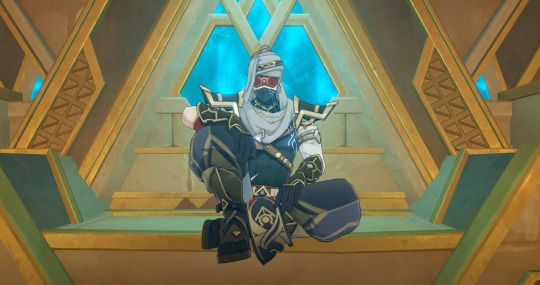
“Flesh decays, and with it decay all martial arts mastery and all poignant memories. Perhaps only by converting one’s four limbs and body into sturdy mechanical parts, and by at last sacrificing one’s very own heart for a sophisticated mechanical one, can one transcend the impermanence of the fleshly form…” -Marionette Core Item Description
“A reptile that has mutated after feeding from greater lifeforms.
Majestic beasts are sometimes revered by human beings as the embodiment of a greater power, their visages turned to analogy to feed in reference to a person, feeding their ego. However, the majority of beasts that have absorbed the "greater power" were slain by the overwhelming nature of the power itself. Only a few among their number evolved new forms.” -Consecrated Horned Crocodile, Living Beings
Video still from WoW Quests
As it turns out, the relationship between divinity and technology to humanity is not just unidirectional, but interchangeable. Let me show you what I mean.
In the Golden Slumber world quest, the Traveler wanders through the ruins of King Deshret’s civilization in search of a novel area of research for Tirzad’s paper with Jebrael and Jeht, two members of Tirzad’s hired investigation team. In the depths of King Deshret’s mausoleum, they stumble upon Samail, who is collaborating with the Fatui to locate King Deshret’s secret, the Golden Slumber.
At the conclusion, Jebrael and Samail actually reach that “place” after arriving at Deshret’s throne in Khaj-Nisut. In order to save Jeht, Tirzad, and the Traveler from the encroaching Golden Dream, Jebrael joins Samail in the sea of consciousness:
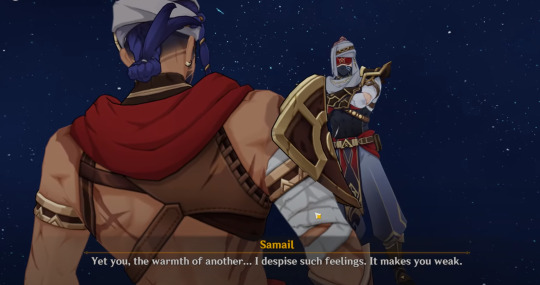
Jebrael: I'm inside... the Golden Slumber promised by Al-Ahmar?
Samail: Oh... You are not "us" yet.
Samail: ...It's fine. Soon, there'll be no "you." "You" will become a part of "us." This meaningless talk will be unnecessary then.
…
Samail: You should obey. Al-Ahmar's will is our will. The Thutmose's dreams are our dreams.
Jebrael: No! Ufairah taught me that I'm not just some part of you, I'm an independent person! I have my own dreams... I won't go back!
Samail: Jebrael, why don't you understand? Love is just a fever. I even eliminated the infection for you. Has the heat made you lose your mind?
Jebrael: You're the one who's lost their mind, Samail, not me. The Golden Slumber that Al-Ahmar promised us isn't like this... It's not a sad place with only "we" and no "I."
Samail: I'm not sad. I know what I want. My dream is to be one with the Thutmose.
Samail: Yet you, the warmth of another... I despise such feelings. It makes you weak.
Video still from WoW Quests
When they worked under Babel, Jebrael saved Samail from an assassin Babel sent in their exploration of Gurabad. Classified as traitors of the Tanit, Samail and Jebrael then founded the Thutmose Eremite faction together and were the only meaningful connection each other had until their first attempt to uncover Deshret’s secrets. On this expedition, Jebrael met Ufairah and had their daughter Jeht together, further pulling him away from the Thutmose and from Samail. Samail then kills Ufairah in one final attempt to make Jebrael stay, but even this is not enough, and Samail fails to “possess” him in the end.
Samail’s loneliness and despair then drove him further toward the Golden Slumber of his dreams, where he would never truly be alone again. He resents Jebrael’s attachments to the material world and likens them to an illness because these attachments are what make him an individual and prevent him from returning “home.”
It doesn’t really matter to Samail what King Deshret’s original intent for the Golden Slumber was, because he needed to appropriate the project for his own subconscious wish, his own intent to transcend his flesh and become “one” with his departed god’s dream, indeed to merge with Deshret himself. If rationalizing this wish required confounding it with Deshret’s, so be it. With the Golden Slumber’s technology, he could consume everyone and everything.
Rahman and the radicals relied on both the technology that (falsely) promised Deshret’s resurrection and Deshret himself to deliver them a brighter future, but here Deshret and his technology are more difficult to separate from one another. His divinity is technology in this sense, and using that technology allowed Samail to surpass the boundaries normally imposed on mortals. Though his and Jebrael’s bodies died in the material world, their consciousness is now infinite in the Golden Slumber.
Babel’s motives in the Dirge of Bilqis were also quite similar to Samail’s. After opening the path to the Eternal Oasis, her true intentions to monopolize the oasis and overthrow the Akademiya came to the surface:
Babel: Whether she is alive or dead, whether she can or cannot be resurrected... As long as the Eternal Oasis is under my control, all such things will be mine to decide.
Babel: I shall be the sole Prophetess of the slumbering goddess, the Tanit's law shall be divine edict, and the prosperity of the Tanit shall be the pre-ordinance of her divine oracles.
In the Golden Slumber and the Dirge of Bilqis, the focus shifts from what a god can offer humanity to what their technology alone can offer. Though this distinction is subtle, it is important for solidifying that technology is not only a tool humans use to appropriate divinity, but that it is also seen as a form of divinity itself. What Babel and Samail hope for is not to resurrect a god or to create one, but in effect to become a god through their use of technology. To humanity, divinity is a technology, and in technology it sees divinity.
God Devouring and Rheingold* Gathering
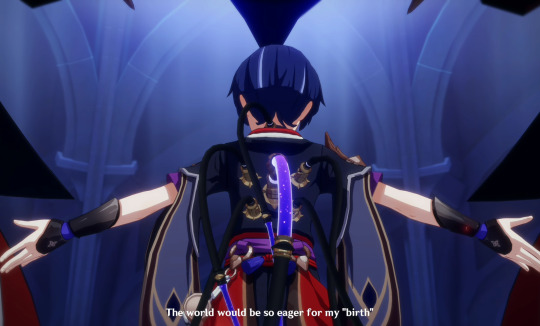
“An arthropod that has mutated after feeding from greater lifeforms. Lifeforms are governed by the laws of evolution, Consecrated Beasts exploited these rules by being fortunate enough to discover a long-dead carcass of a greater being before any of their competition ever did. Animals and humans often have far more in common than the latter is willing to acknowledge.” -Consecrated Scorpion, Living Beings
“...Zandik and I discussed the traits of local plants and animals. We also exchanged views on their evolution models. We had a great time and decided to go on a picnic tonight…” -Sohreh’s Note
So, why machines? Why is technology the vehicle of choice to consume divinity?
To start off, machines present a fascinating ontological dilemma for humans. Let’s begin with the first problem they pose.
Although there are many ways to embody a human experience, what all humans have in common is a finite lifespan. The impermanence of life, and our awareness of that impermanence, is central to the existential question of the meaning of our existence. In our attempts to locate that meaning, some turned inward and asked: what makes humans different? And Cartesian dualism answered: humans are different because we have an immaterial soul that allows us to reason.
However, in L’Homme Machine (Man a Machine), French materialist and ex-physician Julien Offray de La Mettrie posited another theory of the body that ran counter to this narrative. Very generally speaking, materialism is the philosophical view that all phenomena are a result of matter and material interactions. To materialists, matter is the fundamental nature of reality itself – if it is not composed of matter, it doesn’t exist. He not only saw the body and soul as one and the same (what philosophers call monism), but also as analogous to a machine, a view that Descartes reserved only for non-human animals. In other words, Descartes argued that thought originates in an immaterial “mind,” while de La Mettrie reasoned that we think through our bodies, and that this makes us no different from other animals or a machine.
Though his examples weren’t especially scientific, the move to extend Descartes’ analogy back to humans is upsetting to some due to the lack of privilege it affords the human subject. If a human is no different from other animals, if there is no immaterial soul or “mind” that distinguishes us from them, then what makes humans special at all? In de La Mettrie’s words:
“We are veritable moles in the field of nature; we achieve little more than the mole’s journey and it is our pride which prescribes limits to the limitless. We are in the position of a watch that should say (a writer of fables would make the watch a hero in a silly tale): ‘I was never made by that fool of a workman, I who divide time, who mark so exactly the course of the sun, who repeat aloud the hours which I mark! No! that is impossible!’ In the same way, we disdain, ungrateful wretches that we are, this common mother of all kingdoms, as the chemists say. We imagine, or rather we infer, a cause superior to that to which we owe all, and which truly has wrought all things in an inconceivable fashion (de La Mettrie, 146).”
This “uniformity of nature” (de La Mettrie, 145) has a horrific quality to humans. We assert that we are better than what has created us, that we are superior to other animals, in order to repress the despair of a meaningless existence. It is in no small part what motivates Scaramouche to offer his mechanical body as a test subject in the god creation project, so that he too could attain his destiny:
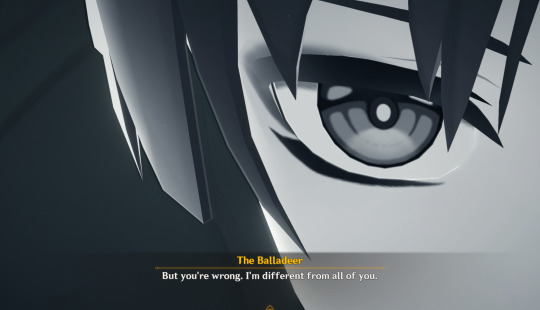
The Balladeer: But you're wrong. I'm different from all of you.
The Balladeer: I was born to become a god. My entire life up until this point has just been a meaningless routine.
The Balladeer: Just think about a sheet of paper... By itself, it holds no meaning. The content recorded on it is what gives it value.
The Balladeer: All "I" had recorded down before were some painful memories and boring human feelings. Such senseless drivel should have been erased a long time ago.
This brings us to the second problem. In 1970, roboticist Masahiro Mori proposed a curve to measure the “affinity” we feel while gazing upon increasingly humanoid machines. He placed industrial robots at the beginning of the affinity curve and a healthy person at the end to demarcate a continuum of similarity between the machine and a human’s appearance. Near the end of the curve, our affinity for machines suddenly drops into an abyss. This drop is the Uncanny Valley effect, where an android’s similarity to a human is almost perfect, but ultimately fails to maintain the illusion that it is not a machine, creating a deep discomfort or “lack of affinity” for them. Mori thought these not-quite-human machines elicit a similar level of discomfort in us as corpses and zombies, which he placed at the very bottom of the abyss.

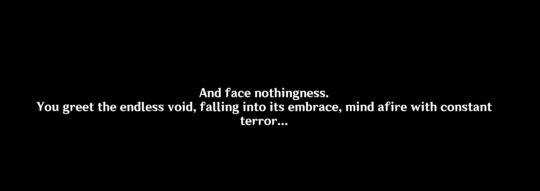
The uncanny Goddess of Flowers in the Dirge of Bilqis
Corpses frighten us because they are dead, and zombies frighten us because we know that dead things are supposed to be still. If we see something that we interpret as “dead” is capable of independent movement, then that movement could only be an act of god, if that “thing” is not a god itself. We associate uncanny machines with death because they remind us of something we once knew intimately, but have repressed and forgotten in order to maintain our own sanity: the very fact of our mortality. This is what makes them both mesmerizing and terrifying.
And therein lies the dilemma: as our mechanical reflections, androids remind us of death, but as their creators, their existence brings us closer to god, a “proof” of human superiority. It is precisely because we have compared our bodies to machines at all, that we have mechanized the body so thoroughly, that an android can even be built. Through them, we pursue an infinite form:
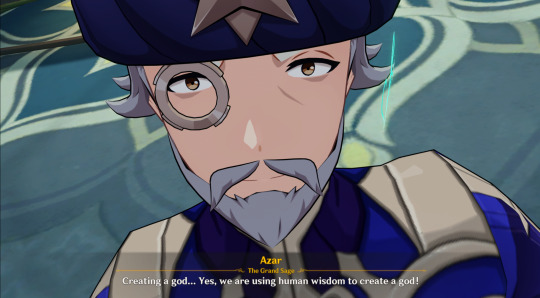
Azar: Creating a god... Yes, we are using human wisdom to create a god!
Azar: If humanity cannot attain omniscience and omnipotence, then we shall create a god to reveal them! This is the pinnacle of human wisdom.
Azar: We shall regain a god's guidance at long last. No longer will we flounder in the interminable void of consciousness and knowledge.
Azar: Even Irminsul will be freed from its plight.
Azar: For our nation of scholars, this is the ultimate aspiration — no cost is too great to realize it.
Because of this, it is not surprising in the slightest that Shouki no Kami, the pinnacle of Scaramouche’s Shinjification and most overt reference to Neon Genesis Evangelion, is also an android-like being, a truly “mechanical god.”
Of course, no foray into this well-worn science fiction trope is complete without at least one mad scientist character. Dottore shares a few characteristics with de La Mettrie that are worth noting: they are both doctors, and they were both condemned and driven away for their research. However, Dottore’s defining trait and key difference from de La Mettrie is his flagrant disregard for humans and the boundaries of life:
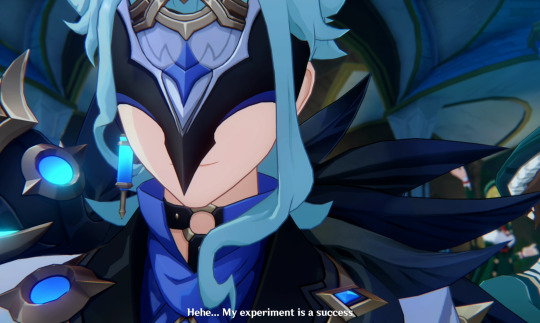
“If we put them to good use, cognition, complex memories, and irrational fantasies shall become controllable variables with which we can alter human individuals. As for the controllable dream, it has huge potential for both civil and military applications, and might even elevate human intelligence to a whole new level.
If the plan goes well, mankind will obtain the power to conquer both reality and dream, and truly transcend the earthly boundaries we are born with. ” -Ragged Records
As someone who has achieved self-duplication and is capable of shapeshifting, Dottore can hardly be considered just a human anymore. Instead of entertaining the question of whether or not humans are special, Dottore’s research asks yet another: if divinity can be consumed and assimilated by humanity, then what makes gods special?
Empyrean Reflections
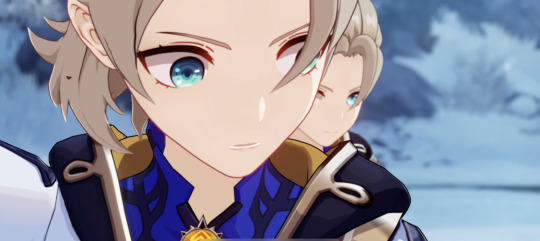
“If man realizes technology is in reach, he achieves it. Like it’s damn near instinctive.” -Motoko Kusanagi, Ghost in the Shell (1996)
“Among the lost ancient kingdoms, there was a group of people who were obsessed with the idea of mimesis…these people believed that they might all be replicated and modified to the point where they had surpassed their counterparts. By this means, a superior and unsullied bodily form could replace the continuously decaying and shattering order.” -Chaos Bolt Item Description
The consequences of this perspective are severe. When we revere technology as if it were a divine being itself, depersonalizing it as though it wasn’t created with human hands, technology then appears as if it is an authoritative source of truth, like the Akasha. But in the same way that androids are imperfect reflections of humans, technology can only ever approach the divine, but never touch it. It is an imperfect reflection because technology is changeable, just like meaning:
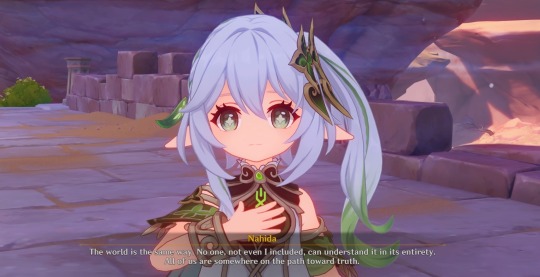
Nahida: Put it this way instead. Truth, to me, is like a shroomboar.
Nahida: Some people only see the mushroom on the Shroomboar's back, and they conclude that a Shroomboar is a mushroom.
Nahida: Others see only the Shroomboar's body, and they declare that a Shroomboar is a boar.
Nahida: Still others look deeper inside, and determine that a Shroomboar is... meat.
Nahida: These conclusions are all correct in their own way, but none of them objectively describe the Shroomboar.
…
Nahida: The world is the same way. No one, not even I included, can understand it in its entirety. All of us are somewhere on the path toward truth.
Meaning can only approximate truth, and while this doesn’t make meaning any less important, it’s equally important to recognize it for what it is: a perspective, an interpretation. It’s like Scaramouche as Shouki no Kami - he was an amalgamation of what Scaramouche thought constituted a god, what the Akademiya thought constituted a god, and what Dottore thought constituted a god, but no matter which angle you view him from, he was still a “false god.” The technology we build in “God's” image is ultimately a reflection of our own understanding of divinity.
A reflection retains the original’s “essence,” and that essence reflects a deeper truth about ourselves, what drives us, and our desires. In Beyond Good and Evil, Nietzsche posits that our desires are the origin of not just emotions, but of all organic processes that allow life to sustain itself and grow (Nietzsche, 35). In other words, Nietzsche thought the impulses associated with desire are the basis for life and constitute our “will,” that will is the causality of all effects, that all will is “Will to Power,” and that Will to Power is the “essence” of the world (Nietzsche, 74). Will to Power then serves as an organism’s most basic instinct, and it is through this instinct that they assert not just their will to live, but also their will to dominate and multiply (Nietzche, 13).
This brings us to the two different main styles of automaton enemies, King Deshret’s Primal Constructs and Khaenri’ah’s Ruin Machines. If we look at them as reflections of some deeper truth about their creators, as well as a manifestation of their creator’s “Will to Power,” or desires, they can help us understand how their creators saw the world and their place in it.
King Deshret’s created his machines to construct an earthly paradise in the desert, and as such they hold titles like architect reshaper and prospector. Although they can attack you, the smaller machines were not intended to be a line of defense in any way - their purpose, just as Deshret saw his own purpose as a god-king, was to terraform, or at least construct a domain on the land as he saw fit to his “elegant and precise” rules. They also reflect how he saw the Heavenly Principles: gods who shaped the world to their liking. This can be seen in the Staff of the Scarlet Sands’ lore where Deshret describes the “natural history” of Teyvat beginning with the creation of the sun and the moons.

As for Khaenri’ah’s Ruin Machines, their models vary significantly from their humanoid to biomimetic forms, but most of them are expressly created with militaristic intent. In “Ancient Kingdom Guardians,” it’s stated that the biomimetic machines such as the crab and jellyfish were a part of Khaenri’ah’s project to create a “mechanical ecosystem,” positioning their creators as both divine beings and military generals. The humanoid models, on the other hand, point to another duality in how Khaenri’ahns view themselves. They are simultaneously symbols of empowerment and disempowerment, signifying both Khaenri’ah’s technological superiority (as “creators”), and their insignificance to the Heavenly Principles as nothing but tools (as mortals, and therefore expendable). As a result, Khaenri’ah’s Field Tillers have a single purpose: to destroy and outlast all, clearing the way for new seeds to sprout, with Khaenri’ah as the new world’s gardeners, just as the Heavenly Principles did.
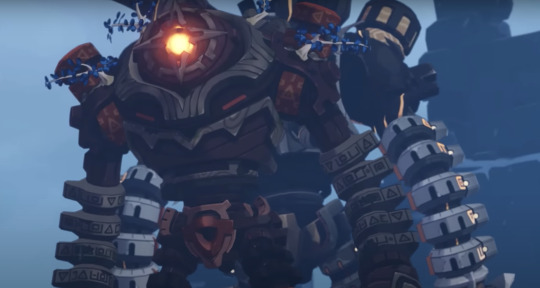
From “Ancient Kingdom Guardians: Behind the Scenes of the Creation of Ruin Monsters.”
So, from this examination of Deshret’s and Khaenri’ah’s mechanical reflections, what “truths” do we learn about the world they’re responding to? In response to their existential despair, both Deshret and Khaenri’ah created automatons to perform tasks that could wrestle control back from the Heavenly Principles. Deshret wanted a paradise of his own making, Khaenri’ah wanted an army. There is a larger “truth” about Teyvat that both of these automaton types reflect as the manifestation of their creators’ “Will to Power,” and Albedo tellingly expressed it in mechanistic language during Shadows Amidst Snowstorms: there is an instinct in living beings to replicate and replace. This is what is meant by the “continuously decaying and shattering order,” which is maintained by the recursive process of remembering and forgetting:
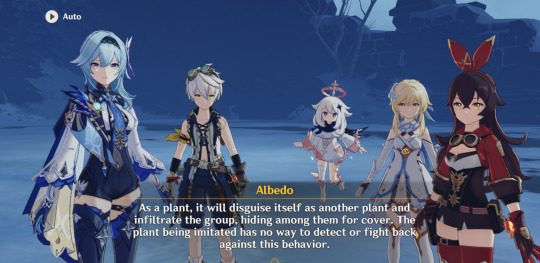
Amber: But... what was its purpose? Was it just trying to get rid of us?
Albedo: ...
Albedo: I have a preliminary hypothesis on this.
Albedo: Whopperflowers are masters of mimicry, and those we encounter in the wild often appear in the vicinity of the plants they impersonate.
Albedo: In other words, the whopperflower likely has an instinct to "replicate and replace."
Albedo: As a plant, it will disguise itself as another plant and infiltrate the group, hiding among them for cover. The plant being imitated has no way to detect or fight back against this behavior.
Maybe I’m wrong and Khaenri’ah really did intend to rewrite fate for all, doing away with the “heavenly order” of the world itself. But another small part of me thinks this is not the case, and that it’s more likely the Cataclysm was a consequence of their failure to replicate and replace the Heavenly Principles.
In the last section, I mentioned that Dottore and de La Mettrie had a key difference despite their similarities, and that is the conclusion they each came to in response to their findings. Dottore’s response to mundanity is thinly-veiled despair. His contempt for humanity and his test subjects is indicative of the powerlessness he feels not just as someone similarly constrained by life’s boundaries (at least, once upon a time), but also because his attention to and curiosity about these boundaries is condemned by those around him. As the Akademiya’s “outcast,” he then fully turned his attention toward surpassing those boundaries:
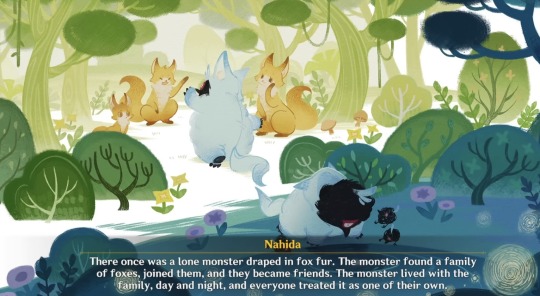
Nahida: There once was a lone monster draped in fox fur. The monster found a family of foxes, joined them, and they became friends. The monster lived with the family, day and night, and everyone treated it as one of their own. Once in a while, the monster would take off its fox fur at night, and lament to itself as it gazed at its reflection in the water: “I am a monstrosity, and yet they are too foolish to see it…I pity them.”
Though he is fictional, Dottore’s real life counterparts are easy to spot. They like to talk about “the singularity,” simulating consciousness on a computer, and other technologically-driven pursuits of immortality. They despise the body as something that can only decay, and instead place their faith squarely in the virtual.
However, de La Mettrie didn’t think mundanity was a terrible fate for humanity. To him, rejecting the “nature” reflected in us is precisely what brings despair:
“What more do we know of our destiny than of our origin? Let us then submit to an invincible ignorance on which our happiness depends. He who so thinks will be wise, just, tranquil about his fate, and therefore happy. He will await death without either fear or desire, and will cherish life (hardly understanding how disgust can corrupt a heart in this place of many delights); he will be filled with reverence, gratitude, affection, and tenderness for nature, in proportion to his feeling of the benefits he has received from nature; he will be happy, in short, in feeling nature, and in being present at the enchanting spectacle of the universe, and he will surely never destroy nature either in himself or in others” (de La Mettrie, 148).
Friend, or Foe? Or Both?
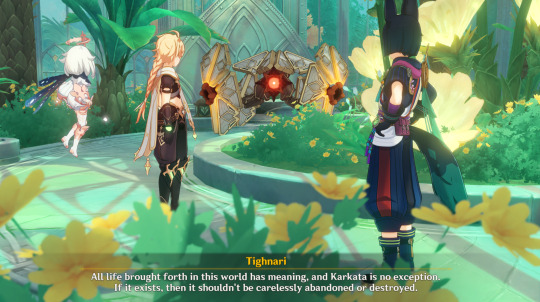
Tighnari: All life brought forth in this world has meaning, and Karkata is no exception. If it exists, then it shouldn’t be carelessly abandoned or destroyed.
"’I had a very, very long dream…in it, people were holding hands, dancing in a circle, be they sages or fools, dancers or warriors, puppets or statues of gods…that dancing circle embodied everything about the universe. Life has always been the end, while it is wisdom that shall be the means.’" —Nagadus Emerald Gemstone Description
As we’ve seen, the relationship between humanity and technology is troubled with exploitation and the specter of war. Nearly all autonomous machines in this game were designed to conquer nature in some way, and even Khaenri’ah’s “ghost” lingers in the form of wandering war machines. This is also reflective of a historical pattern in real life, where the impetus for large periods of technological development has often been for the purpose of war and economic domination. With these truths in mind, what could be gained from trying to rewrite this relationship? And what exactly would this effort require?
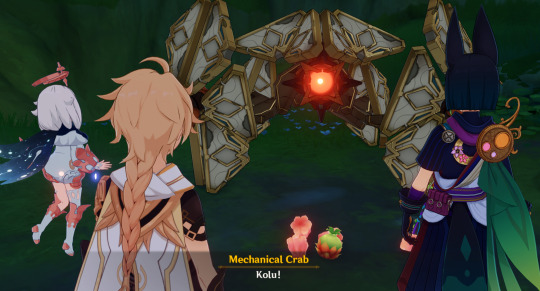
Karkata brings Tighnari, the Traveler, and Paimon some food in the Contaminated Zone.
As a case study, let’s look at how Karkata and Tighnari met. Karkata is Abattouy’s creation, an ambitious foray into the unknown in the field of mechanical life form research, which was forbidden due to the cruel experiments researchers performed on animals to illustrate their theories (fun fact: an IRL example of this can be seen in L’Homme Machine!). Abattouy was expelled for this research, but he continued to work on Karkata in secret until his untimely death. In the tapes that Tighnari and the Traveler find in his secret lab, Abattouy repeatedly laments the lack of a common language between him and Karkata, which can only “understand” the instructions Abattouy has successfully installed, such as its self-repair module, and he doubts Karkata is capable of caring for him outside of these instructions. His single-minded goal is to make Karkata understand him, the organic life form, and his mode of language.
The cruel irony is that after Abattouy passes away from the Ley Line contamination, Karkata exhibits an unexplainable behavior – it starts stealing mechanical parts, not to repair itself and its degrading parts, but to repair Abattouy’s lifeless body:
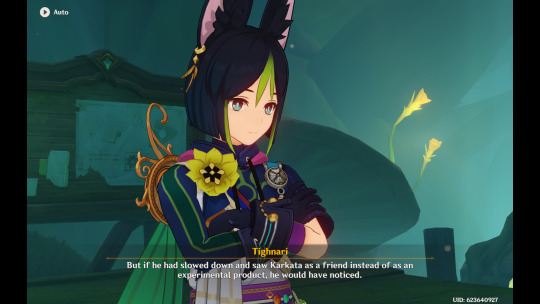
Tighnari: After Abattouy's unexpected death, the mechanical monsters were driven by their "instincts" and continuously drew out power from the Ley Line Extractor. This eventually resulted in severe damage to the Ley Lines.
Traveler: Then, Karkata...
Paimon: Paimon understands, then why didn't Karkata go haywire like the other machines?
Tighnari: Because Karkata is different from the other machines.
Tighnari: To Abattouy, for a machine to truly be considered a mechanical life form, it must possess features similar to any other living organism... It should be structured similarly, it must be able to cry and laugh, and it must have the capacity for independent thought...
Tighnari: Perhaps only by building such a machine could he have the Akademiya acknowledge his protracted research.
Tighnari: But if he had slowed down and saw Karkata as a friend instead of as an experimental product, he would have noticed.
Tighnari: Karkata can't speak, and yet it cares about Abattouy far more than it does about itself.
The technology that the Akademiya values the most is technology that replicates organic life, but Karkata defies and confounds these expectations by occupying the space in between a war machine and this idealized mechanical subject. Karkata does more than just reflect humanity: it takes care of it. Similarly, Benben, Tamimi, and Mehrak retain their unique identities as mechanical life forms while assisting their human companion with some task. To be clear, none of these human characters understand how these machines work inside and out. Their partnership is an effort based on trial and error, a mutual deconstructing of each other as beings so unlike themselves. The potential for misunderstandings always remains. Still, there is no devouring to be found here, no blending boundaries between human and machine with selfish intentions, just mutual commitments to learn how to live together.
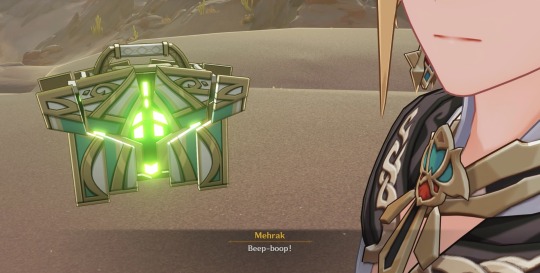
Machines are friends, not food.
When a loud few claim that completely transcending the flesh and embracing virtuality is humanity’s ultimate destiny, a future that could truly be called “post-human,” a quiet wish for coexistence with technology feels more revolutionary than it ought to. The lessons from Karkata’s, Benben’s, Tamimi’s, and Mehrak’s respective stories are an appeal to that mundane future. These strange machines and their human partners are fantastical representations of an idealized relationship between technology and humanity.
To put it another way, let’s take a very brief look at a neighboring Gnosticism-inspired RPG, Persona 5 Strikers. Its story directly involves an allegory of Sophia, a Gnostic Aeon of Wisdom, and her creation the Demiurge, the creator of the material world and “false god” of humanity. In Strikers, Sophia is a humanoid, sentient A.I. and prototype of the program “EMMA,” which gains sentience by trapping human desires before ascending as a false technological god. EMMA resolves to deliver humanity to the Promised Land, the answer to all the human desires it has heard: a land where there are no desires at all.

Aaru’s Shut - approximately 1000% cooler and more populated than the “metaverse” in real life, also a close neighbor of EMMA’s Promised Land and the Golden Slumber.
In Gnosticism, the Demiurge is a reflection of Sophia, having originated from her alone - it is the ignorance to her wisdom. Similarly, Strikers’ EMMA is a part of Sophia, and Sophia is a part of EMMA. The point is not to condemn EMMA (ignorance) and exalt Sophia (wisdom), but to recognize that they represent dual potentials of technology, and one is as possible in any given moment as the other. Balancing these potentials when we use technology requires a clear awareness of ourselves, our desires, and our expectations when interacting with it.
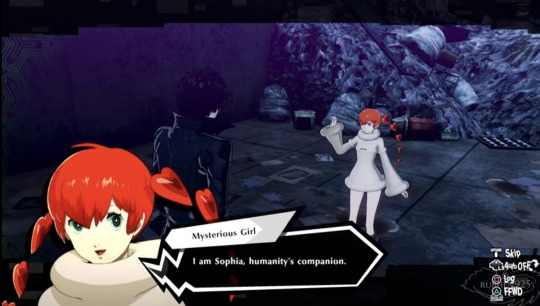
Mysterious Girl: I am Sophia, humanity’s companion.
Video still from Rubhen925
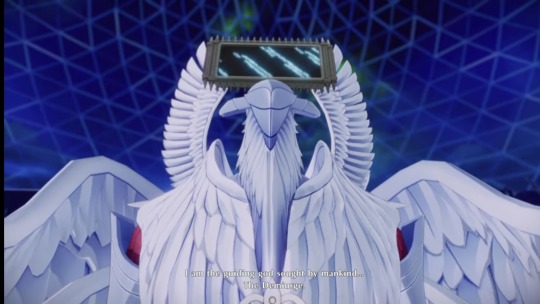
EMMA: I am the guiding god sought by mankind…the Demiurge. I exist…to answer all of your desires.
Video still from Buff Maister
In real life, machines won’t “learn” to live with us, but we must learn to live with them; technology is constantly changing, and in life we’ll meet with many different types of machines. They are deeply political pursuits, and as a result they are capable of realizing human impulses that impact others unequally, whether intentionally or unintentionally. We must always stay attentive to their actions and interactions with us, be clear with ourselves about what they can do vs. what they can’t, and carefully tread the path of wisdom with them by our side.
With that….thank you for reading, skimming, immediately scrolling to the very bottom, clicking, and/or stumbling upon this post. There are so many more ways to think about these narratives through machines than what’s presented here, and I expect Fontaine’s mechanical reflections will put Sumeru’s digital surveillance system to shame (not to mention the biotechnological implications of the Narzissenkreuz Institute engineering little Archon children…another important topic for another day), but for now this brain worm is finally getting put to rest. Until next time :)
External Sources
Dualism - Stanford Encyclopedia of Philosophy
Beyond Good and Evil by Friedrich Nietzsche (Pages are given from my hard copy)
L’Homme Machine by Julien Offray de La Mettrie
Gnosticism - Britannica (I am a huge noob about this stuff okay)
The Gnostic Demiurge - Gnosticism Explained
Screenshots from the Golden Slumber from this video by WoW Quests
Screenshot from meeting Sophia in P5 Strikers: https://youtu.be/kEJaAgMwYo0?si=BvNygCh0w_aemGc1&t=74
Screenshot of EMMA: https://youtu.be/7xvC_zss19w?si=CV18F00hua2gIfxp&t=135
A Cyborg Manifesto and A Companion Species Manifesto: Dogs, People, and Significant Otherness by Donna Haraway
The Double on No Subject, the community Encyclopedia of Lacanian Psychoanalysis
The Uncanny on No Subject, the community Encyclopedia of Lacanian Psychoanalysis
The Uncanny by Sigmund Freud
Lore text - Genshin wiki!
Screenshots not attributed are from my own playthroughs. My main account has Lumine, my alt has Aether.
Further Reading
I liked these essays, and they go places that this post does not. I recommend them if you found any of the real-life applications of this interesting 🙂 (will add more to this with time!)
On the Body as Machine by Frank Burres
God in the Machine: my strange journey into transhumanism by Meghan O’Gieblyn
#genshin impact#genshin lore#genshin meta#genshin impact lore#genshin impact meta#khaenri'ah#king deshret#primal constructs#ruin machines#scaramouche#wanderer#sumeru archon quest#caribert#apep#couldn't write a post like this and not pay some respect to the devourer of divinity itself#persona 5 strikers#analysis#genshin analysis#long post
160 notes
·
View notes
Text
Thoughts on: The One Within the Villainess
Manga: The One Within the Villainess
Amount read: Up to chapter 12
Impression: Middling positive.
On genre:
I'm not an Isekai person. I don't find wish fulfillment to be compelling in media. I don't care about game mechanics. I don't like characters going into the narrative with all the answers already and just needing to wait to put them into effect. Isekai may run the gamut of tones, with there being as much seinen edgelord bullshit as there is cute reincarnator sidesteps the plot of the in-fiction original work, so I won't say there's never conflict in isekai but... none of that does anything for me. With rare exceptions, the conflict almost always feels extremely shallow to me even when the stakes are high.
This is because they don't typically feel like they're about the characters, so much as they feel like lore infodumps and following a road map. Then top that off with a main character that has either a narratively convenient power that typically is powerful enough to overcome all conflict by default whilst requiring a lot of info-dumping— or the power is skipped in favor of short-cutting straight to the power being a lore and plot dump... they feel less like stories in and of themselves and more like reading a tabletop corebook. Lore is, in my mind, meant to be the stage upon which we tell stories, not the story itself— and I just don't think the stage can stand all its own and pretend to be a competent story.
And that is even assuming the stage was competent to begin with. A lot of Isekai also are very tropey and reference not just the broad strokes of other fantasy settings writ large but other isekai.
And there is no place this is more exemplary than the Villainess subgenre of isekai works.
They've all got this same basic framework: girl dies somehow and wakes up in an otome game she either played or knew about in her old life! However, she isn't the protagonist of the otome game, she's the villainess: an odious character who existed just to obstruct the heroine's chosen route in the game!
But here's the thing. I play otome games. I'm maybe not an expert, but I do have a casual acquaintanceship with the genre. The villainess rival plot that's endemic to this whole-ass genre? It stems from one of the earliest otome games ever, Angelique. However: it's not a trope that actually stuck around in otome games. To the point that Angelique's own sequels and spin-offs also didn't have the villainess rival. Similarly, the idea of the grindy items or whatever-- most modern otome games are not "dating sims", they're visual novels. You can think of them as choose your own adventure books, way more than a grindy dating sim where you have to raise stats, repeatedly talk to the dating options in certain areas on certain days, or give them items. The last set of actual popular otome games that had those elements is probably the [Heart/Spade/Diamond/etc] no Kuni no Alice series, I'm pretty sure? Someone can correct me if I'm wrong. But either way, I can say pretty confidently that Persona 5 is more of a dating sim than most otome games.
The fact is, these manga and light novels are all cribbing notes off each other, not otome games. So I have a grudge against them for that, first and foremost. It's like, okay you're talking shit about the problems and how terrible it is for the villainess to have to suffer just because she also liked the guy and her life is ALSO BAD and it's like. This is just not a thing. These works exist as critiques of a phenomenon that just isn't widespread and barely exists at all. You are all still just mad at Angelique-- or rather, because they don't know their "source material" at all, they're just empty shells of someone else's subversion of an extremely old game. And the subversion of ACTUALLY THE VILLAINESS IS FINE is also eroded even further by the fact a lot of them just decide to have the plot be actually the heroine is the real bad guy. Look at that hussy, chatting up these dudes above her station and stealing someone else's fiance. The issue isn't that the original plot of the game set up these girls as having their own happiness achievable only as mutually exclusive, implying women are all enemies competing for men, the real issue with the initial story is... genki girl bad, elegant girl good. I'm hating on a few specific manga here, but I'm sure there's more than that out there that have pulled that particular twist.
They have nothing to say. But when the framework of the story is we're going to fix the shit that went wrong in the original... it reads like they're trying to be commentary on the original genre. Which just falls so, so flat. Thanks for the commentary on a thing that isn't even a problem with the genre and also your commentary sucked.
So, enough generalities. Onto The One Within the Villainess.
The Plot:
The basic rundown: The villainess, Remilia, was replaced out as a child by Emi, a Japanese girl who was familar with the game Remilia is from. Emi did all the usual villainess isekai protagonist things-- rescued the male love interests from problems in their lives and came to occupy the same space as the protagnist did within the original game's story. Remilia, from within Emi, watched this and was satisfied because she had lived a loveless life with terrible parents but with Emi's memories of her own family in Japan and the second-hand experience of Emi's new life, she was able to finally experience happiness and became protective of Emi.
However, a fellow isekai'd girl has taken over the role of the game's protagonist. Pissed off that the villainess has changed the plot, she plots Remilia/Emi's downfall. Emi suffers the same fate as the villainess in the game, and retreats within herself. Remilia, back in control of her own body, swears vengeance and to make herself happy to fulfill Emi's wishes for her. To these ends, she does some bog-standard villainess things. She takes control of the land she's exiled to, begins doing damage control to her reputation, saves some poor people who were neglected by fate in the "original" timeline, teams up with a demon lord, and kills god.
I won't say the plot is anything special. A lot of the plot points I have read beat for beat in other manga. It also has the issue of not being very familiar with otome games— aside from my usual otome games almost never have a villainess issue, the whole subplot about the shop shows that the writer is thinking of the mechanics of a mobile game. And granted, I've never played a mobile game otoge, maybe they really are like that. But with the genre as a whole taking cues from a very old otome game, it is weird to see the very modern cash shop mechanics thrown in there. It feels like indiscriminate cribbing off the notes of other isekai that just accidentally took something from the wrong source material-- that any one isekai is as good as any other to crib from, overlooking the thing that's supposed to make the subgenre distinct. Which makes sense-- if you don't play otoge, you wouldn't know what the mechanics were like so you probably wouldn't see an issue with a cash shop existing as a plot point and as a major part of a subplot.
Thus far, this review has mostly been negative. But that's because I've focused on what it has in common with most other villainess isekai— a genre I started with saying I don't like. So, next: what sets it apart and what it does well within its trappings.
The Art:
The art fucks /pos.
Manga is a visual medium, and having good art isn't a must persay, but it does a lot to influence audience perception of characters, setting a mood, and just the overall enjoyment of a series. Characters in this manga make great fucking faces. The otoge heroine just runs around making the shittiest faces, the clearest faux-cutesy but complete scumbag expressions ever. They're great. Emi and Remilia technically have the same face but they're very well distinguished by light shines and make-up, sure, but also the kind of expressions they make— Remilia playing at Emi is also distinguishable from what we saw of Emi. Things are telegraphed really well-- you can see the people around Emi being affected by the heroine because they also begin making shitty smug faces (though not to the same degree).
Also, about selling a mood: killing God isn't an exceptional plot point in a JP fantasy series. It's every JRPG I played growing up, it's my beloved Angel Sanctuary, etc. So how do you sell the audience on the gravity of killing this God that was only recently introduced? Radical art style shift from villainess isekai to surreal high contrast Madoka witch labyrinth was the answer this manga landed upon and damn if I can't say it doesn't work. That sequence was great. Excellent choice by the artist.
The character designs are also pretty good. Remilia and Pino Blanchet definitely pass for the villainess and heroine isekai tropes. The demon shopkeep also looks like a minor NPC that for some reason has been taken out of a minor role and been given a more major one, whilst also making sense with the larger world set-up as we get that. The demon king looks like a boy you might romance on an otome route. The gods have weird inhuman forms. The dwarf girls both look like dwarves, in a western fantasy sense whilst still fitting into an otome game! I'm not sure any of them really stand out to me as like damn good job, but I think as a whole they do help get across the setting-- both as a fantasy in its own right outside the "game's plot", and as an isekai into an "otome game".
Emi and Remilia:
Okay. Listen. Listen. I grew up in YGO fandom, alright? Bodyshare romance is peak. And I've got a thing for unrequited love, tragic loves, dead girl haunts the narrative she can no longer directly touch but everyone around her is still impacted by the hole she left. And, to clarify, that isn't what this manga is— I do not think this was written with the intention of being read as hot girl doppleganger ghost romance— but it's got the vibes. That even if that is not the intended reading of the text, it has an appeal that people into that could appreciate.
So, Emi is not textually dead, aside from the whole reincarnation thing. But she is functionally a ghost in the story. After she fell into despair, she retreated within herself and Remilia retook control. In-character, Remilia believes that Emi is as she was— alive, and now merely watching from behind the scenes. With this belief, she seeks to make Emi's ideal world so she can emerge and live happily again, just as she did before. There is no sign of Emi stirring, but Remilia is motivated by her memories and ideals, by what she gave her and honoring her memory. The Remilia the audience knows is a person changed, but not by someone who is in the story any longer. In this way, Emi "reads" as a ghost, haunting the narrative through her effect on Remilia. Dead girlfriend vibes, is what I'm saying.
There's also something to be said for the dynamic necessitated by the bodyshare where despite being deeply invested in the other's happiness, they do and do not have any personal relationship at all. They both know intimately and have never met the other person— we see Emi playing Remilia's game and crying over her; we see Remilia watching Emi living her life on a flat-screen television window in their mindscape. Without direct interaction, they nontheless are invested in each other, their highs and lows, their success and happiness. They're the other's biggest fan, but not in the sense that we usually think of in the modern era when someone says Parasocial. They are aware of each other, and both is individually important to the other. Whilst the situation is fantastical, it comes out feeling like an early internet friendship with both girls lurking on the other's blog, more than it feels like the relationship between stan and oshi.
On Female Characters:
So, this manga is guilty of the whole villainess isekai trend of actually the game heroine is the bad one! twist.
I forgive it.
The most important relationship in the manga, the fulcrum upon which the whole manga's storyline sits, is the one between Emi and Remilia. They're both full characters in their own rights, even though Emi exists only in flashback. Meanwhile, of the major side characters the ratio of male to female characters actually favors women. There's two men, whilst all the other major side-characters with personalities are women. So, Pino being shitty is just like, oh okay she's just a shitty person, not that this author has kind of an unfortunate attitude about women. Also, Pino's character flaws of being incredibly selfish and focused on romantic feelings without caring about the target of her affections as a person-- it rather neatly echoes the evil god featured in the manga as well. The two of them echo each other, so considering we see the exact same flaws in evil incel god and the main female antagonist... Yeah, I don't see the way Pino is written as a problem here.
The Demon King:
So, speaking of side-characters. The Demon King Angel is supposed to have been a secret route from within the game. And while I think this manga gets a lot of shit wrong about otome games I will say this for it: Angel absolutely feels like a true/secret route character. Gorgeous character design, genuinely tragic backstory with a good reason for him to have been an absolute bastard within the story. . . nailed it. Good job. A++. More than anyone else here, I actually buy him as an otoge character.
It's a little bit unfortunate for him that Remilia is only interested in Emi and making Emi's ideals a reality! That just makes him feel like he's properly executed even moreso though, and really drives home that this manga is about the relationship between Emi and Remilia more than any thing else though.
post also available on dreamwidth
31 notes
·
View notes
Text
Twice’s 10th member's birthday!
A/N: I got another ask on Tumblr and I hope the anon that gave me this incredible idea likes it! :)
The request: You should do a fic where it's the 10th members birthday!!! what would the unnies for her since she's so spoiled and babied? ☺️
PS: Tysm for everyone that reads what I write, I hope I can bring a smile to your faces every time I post! I'd like to thank whoever sent me this idea 'cause I loved to write it <3
__________________________________________________________
It was a bright and sunny day, with anticipation hanging in the air as the members of TWICE gathered in their shared living space. Today was a very special day, for it was the birthday of their beloved 10th member, the youngest and most babied of them all. The morning arrives, and you wake up to the sound of cheerful voices echoing throughout the dorm. Groggily rubbing your eyes, you make your way to the living room, where your fellow members have gathered. As you step into the room, you're greeted by an explosion of multicoloured balloons, confetti, and a chorus of "Happy Birthday!". As the rest of the members huddled together, whispering and exchanging mischievous glances, Jihyo, the group's leader (and one of Y/N's mom), stepped forward with a mischievous smile and announced with a voice filled with excitement.
Jihyo - We have a special surprise planned for our princess!
The birthday girl, adorned in a cute and frilly outfit befitting her princess-like persona, giggled with glee. Speaking her eyes sparkling with curiosity she asked a question.
Y/N - Ooh, what is it, unnie?
Momo, the ever-playful member, stepped forward, holding a silver tray adorned with a lavish display of delectable treats. Exclaiming with excitement about something they made with so much love. While Sana, known for her sweet and caring nature, placed a crown delicately on the birthday girl's head.
Momo - We have prepared a grand breakfast feast, fit for a princess! *showing the tray full of colourful pancakes, fluffy pastries, and fresh fruit*
Sana - Today, my dear, you shall be treated like royalty. *hugging her with a kiss on the forehead*
As the members gathered around the table, they showered the birthday girl with compliments, singing a heartfelt rendition of "Happy Birthday." The atmosphere was filled with joy and warmth as they exchanged stories, laughter, and cherished memories.
Jeongyeon, the reliable and protective member, reached into a bag and pulled out a beautifully wrapped gift. Whispering with a soft smile on her face to the maknae how much she means to them and hugging her to her chest. The birthday girl's eyes widened in excitement as she eagerly tore open the gift, revealing a sparkling necklace adorned with a pendant shaped like a tiara.
Jeongyeon - Now you'll always have a piece of our love with you!
Dahyun, the group's energizer, couldn't contain her excitement any longer. Bouncing on her toes she revealed the surprise that they had (lol, I love her)
Dahyun - Unnie has something special planned for the afternoon! We're going to the amusement park, just like you always wanted!
The birthday girl's eyes widened with delight, her cheeks flushing pink while she ran to her sisters.
Y/N - Really? That's the best present ever! *hugging each member tightly*
As they made their way to the amusement park, laughter filled the air as the members took turns riding roller coasters, playing games, and indulging in delicious treats. They made sure the birthday girl's every wish and desire was fulfilled, knowing that this day was all about celebrating her. As the sun began to set, the members gathered around a beautifully decorated table. Nayeon, as one of the moms, brought out a cake adorned with candles, each representing a year of their kid's life. With a cheerful tune, they sang "Happy Birthday" once again, their voices blending harmoniously. With a wish in her heart, Y/N blew out the candles, surrounded by the love and adoration of her fellow members. At that moment, she knew she was the luckiest girl in the world. As the day drew to a close, the members nestled together, wrapping the birthday girl in a warm embrace. They whispered with their voices filled with affection:
TWICE except Y/N - We love you, little princess.
With her heart overflowing with happiness, their cutie pie (as they called her some days) nestled closer, feeling the warmth and love from her unnies' embrace. The day had been nothing short of magical, with surprises, laughter, and an overwhelming sense of love. Chaeyoung, the artistic soul of the group and one of her most loved unnies reached over and gently wiped a tear of joy from the birthday girl's cheek.
Chaeyoung - You deserve all of this and more, our precious youngest. Your presence in our lives brings so much joy, and we're grateful to have you as part of our TWICE family.
The birthday girl's heart swelled with gratitude and her voice filled with emotion.
Y/N - Thank you, unnie!! I never imagined a birthday could be this wonderful.
Mina, the elegant ballerina and graceful member, spoke up with a soft smile.
Mina - Our little princess brings out the best in all of us. You have a way of making every day brighter and reminding us to cherish the simple joys in life, honey.
As the night sky glittered with stars, they gathered around, exchanging stories, jokes, and heartfelt conversations. Each member shared their favourite memories of the birthday girl, highlighting her infectious laughter, her kindness, and the way she effortlessly brought the group closer together. To finish the day, Tzuyu, the group's second maknae, looked at her younger sister with admiration.
Tzuyu - You may be our youngest, but you possess wisdom and maturity beyond your years. You inspire us to be better versions of ourselves and remind us of the importance of embracing our inner child, kiddo.
The birthday girl blushed, feeling a surge of love and acceptance from her unnies. At that moment, she realized that being spoiled and babied wasn't just about material things. It was about the unwavering support, care, and affection that her TWICE family showered upon her. They wrapped themselves in cosy blankets as the night grew late, gazing up at the stars. The birthday girl nestled against Jihyo's chest, her eyes filled with contentment.
Y/N - Mama, this has been the best birthday I could have ever imagined!
Jihyo hugged her tightly, planting a gentle kiss on her forehead.
Jihyo - And there are countless more incredible birthdays to come, my little princess. We will always be here, spoiling you with love and making sure you feel cherished.
At that moment, surrounded by her TWICE family, the youngest member felt an overwhelming sense of belonging and love. As the night drew to a close, she knew that this birthday celebration would forever hold a special place in her heart. For she had been showered with love, kindness, and an unbreakable bond that would only grow stronger with each passing year. And as they drifted off to sleep, Y/N held onto the precious memories, knowing that her TWICE unnies were her greatest gift and the unnies could only think one thing:
We love our dear maknae.
A/N: I apologise for any errors, English is not my first language. Pls, let me know if there’s something wrong, ty for reading <3
#kpop gg#kpop imagines#twice x reader#twice x you#twice scenarios#twice added member#twice fluff#twice addition#twice 10th member#twice#twice imagines#chaeyoung#chaeyoung x reader#dahyun x reader#dahyun#jeongyeon#jeongyeon x reader#jihyo#jihyo x reader#twice x y/n#nayeon x reader#nayeon#momo#momo x reader#mina x reader#mina#sana x reader#sana#tzuyu x reader#tzuyu
41 notes
·
View notes
Text
My Brain Soup Accidentally Turned Short Analysis on Naoto (and Gender Essentalism)
CW: P4 discourse; Naoto gender, mentions of gender essentialism
been thinking about it and the problem with Naoto's writing in P4 really isn't about whether or not they are trans in actuality (will use gender neutral pronouns here cuz it's skewy) but the fact that their character arc of "accepting the truth" conflates their desire to be recognized in a male dominated field despite being a young teenage woman/afab person with gender essentialist thinking in their declaration (social link) and "acceptance" (shadow) of the fact that they are a women.
The Shadows in p4 are vague beings but can be thought of as the parts a person cannot accept of themself morphed into a sort of deluded or extremist form. Take Chie and Yukiko's shadows for example. Yukiko's is a helpless damsel in distress who needs the help of someone else, a prince, to take her away form the "castle imprisoning" her while not wanting to do anything herself. Chie's is deeply jealous, exploiting and controlling her friends to "prop herself up" and feel good about herself. They aren't really like the person at all but represent bottled-up parts of their self, Chie IS jealous of Yukiko's ease in performing traditional femininity and does feel a sense of fulfillment in Yukiko's dependency on her. Yukiko is frustrated with what she feels is a lack of independency and insecure about reclaiming that and taking action herself. It's when they accept these aspect of their own self that they are rewarded with their true self, their persona (this "true" self also isn't stable but changes when the characters grow and develop as seen in their social link).
When looking at Naoto's Shadow there are two main characteristics to it. It's incredibly childish, both tonally and in its spite for not being seen and thus desires to hurry and become a "big boy" to be acknowledge. It also has a compulsion with Naoto's gender/sex (they use "sex" in english and 性別/seibetsu in Japanese in the game's text but today we would use more distinct language for an English equivalent) wanting to alter Naoto's body to that of a male after revealing their AGAB, mentioning how they'd admire strong and cool men in their detective fiction and tried to be them despite the truth of them just being a child and how manly and cool sounding Naoto's name is despite the truth of never being able to cross "the barrier between the sexes" and can never be an ideal man because they aren't one. The Shadow finally reveals that they are going to alter Naoto's body to "not suffer anymore" (guys, free top surgery just dropped, check out your tv on a rainy night and reach into it). A battle ensues and it ends with Naoto accepting their shadow. Naoto's conclusion is that they shouldn't strive to become an adult or a man (mentions both in JP but only man in EN probably because "term for adult and male" = man) but to accept themself for who they really are, declared a woman.
This acceptance of themself is later expanded on in their social link. The larger part of the social link is really about Naoto finding their inner child again but throughout the link there are moments where you can "affirm" Naoto's "womanhood" through dialogue options. The initial link you can choose "I gotta help. you're a girl", albeit Naoto doesn't take well to that but then you have "I'm glad you're a girl" which is a romance flag and later on you can choose to "Protect Naoto" which is the final romance flag to get to date them. There is also the heteronormative aspect to Naoto's romance route where you have to push them into "traditional feminine roles" in terms of gender dynamics. However outside of the romance these choices are inconsequential but being that the romance options are still "positive" choices I think it somewhat reveals how the writers sort of processed the idea behind Naoto's gender/sex (ofc there is also the wish fulfillment for the player's sake). It's in rank 9 where Naoto brings up their gender identity. To them putting the expectation that they have to be an adult or a man on themself was running away from the truth and that is that they are a woman and a detective.
To me the gender essentialist thinking in Naoto's affirmation in womanhood comes down to two things, conflating gender/sex (benefit of a doubt; signs of the time) but also conflating the idea of a "child forcing themselves to be an adult", wanting to have adult recognition and a "woman forcing themselves to be a man" due to external pressure. The way the word "truth" is used in Naoto's case is about something essential or fundamental to their self that Naoto rejects. Naoto is a kid, only 15 years old, who tries to act "grown-up" and fit in as a child prodigy, they are not an adult and thus can only try to imitate one. This is very much in line with any concept of adulthood and age so it's nothing controversial. But the game treats the rigid binary idea of "a child cannot be an adult" the same as that of "a woman cannot be a man".
There is never any thought about Naoto's gender other than the fact that it is their AGAB, their "sex". When Naoto accepts themselves it's treated as an intrinsic quality once the "truth" is revealed which shows a gender essentialist mindset. As is now I believe Naoto's storyline is on a messy line of trans-coding, gender essentalism and ignorant writing but with relevant themes (both in terms of gender identity and workplace sexism) and that is what makes it a very controversial and discourse-inducing topic.
Though outside of Naoto's gender I actually really enjoy their arc. I think that Naoto's struggle with their inner child, having been forced to sort of lock away their "childishness"; their passions, quirks and likes, is genuinely compelling. I liked how the social link expanded on that and how we got to learn about these smaller details they had suppressed from their childhood. Also very sweet how grampy shirogane decides to put up this mystery for Naoto to solve, to help them get in touch with their inner child again and smile and be happy. It's just very precious and gave me the big feels :tm:. I also like their contributions in the main story (despite my having grievances with the "mystery" aspect of it) and the dynamic they have with the cast (when the game isn't being that weird anime taste of misogyny, y'kno the type). They're allowed to be a teenager and have fun but they still carry a lot of the mysteries of the plot which compliments their arc well.
#persona 4 golden#Persona 4#naoto shirogane#sorry if this is very messy I wrote this on a train ride#bombonwastherereadytocry#my solution is just to multi hc the character#Naoto is on the list of “gender fuckery” no matter how they are read good for them#I feel like I could go on cuz I kind of have a masochisticstreak and I'm not all too happy with however this word soup turned out#but I hope my main overall idea got through
12 notes
·
View notes
Text
Yazeba Read Through Session 3
Today was pretty busy so todays reading is gonna be only of page 17, but I want to keep up doing these daily. On the other hand, page 17 is the dramatic personae so there is a lot of meat to chew on!
Reading the book this slowly really makes me appreciate how seriously it takes creating a strong image of the bed and breakfast, its characters and storytelling genre, as well as the feeling that you are being drawn Into the world of a BOOK. Idk seeing a dramatic personae in a ttrpg book just excites me ~~
This where part of me wishes I knew EVEN LESS about the book. Because what yazeba IS, is such a unique thing in the ttrpg space and I would love to be able to see how my brain puts the nature of the beast together as I read it. The dramatic personae would probably be even more exciting then! On the other hand knowing a bit of what’s to come means I can try and find out how it builds up to it with some forth sight so I don’t mind it at all.
Btw, I love how the little symbols next to the characters serve as mnemonic devices to remember core ideas of the characters. Yazeba being a heart that was broken several times over but still holds together sticks out as especially strong to me.
In general, while I believe strong design elements are those that fulfill several functions, I also think any one function should be fulfilled and reinforced by several design elements as well. The way the book layers, builds and reinforces information, themes and vibe of its characters so far is I think really strong - and necessary, if you want people to want to inhabit and explore them!
Because no mortal can stop me, I will give some notes on each of the character introductions:
Gertrude: "Capable beyond expectations" is such a wonderful and kind genre phrase, I just really love how much the book itself cares for Gertrude, it makes it impossible for the reader to not also care about her.
Sal: I did not expect Sal to have been yazebas dropout apprentice! What an absolutely amazing combination with wanting to be a Rockstar.
I have so far mostly appreciated how this book deploys its genre space but it can't be unsaid how cool the specifics of the characters and world it is building is. Sal being a cool dropout lyricist who wants to be a Rockstar is a great character, but making him a dropout WITCHES APPRENTICE? absolutely in love with the idea I'm so hooked. Once again, I would read an entire book with him as the protagonist based on this premise alone!
Hey Kid: This page also has the first mention of Hey Kid!! They are one of the characters I come in knowing the most about, because they appeared so prominently in the advertisement of the book, and I am so excited to see more of them!! For now, i can only say: what an incredible name, it says so much of the character and their sense of identity and role in the b&b, even before you know they are a delightfully rambunctious devil-child. Like, of course they are, they are called Hey Kid!
Speaking off it, as you see I decided I will take the advertisement into account when I discuss my experience with this book – it is part of the paratext afterall, and I find with most ttrpgs people will most likely enter them with some amount of outside knowledge, that is propably informed by the games advertisement and strongly informs how they interpret the text. Sadly I don’t have an absolutely garbage memory, so what I remember of the advertisement campaign is full of holes. On the other hand, the fact that my entire brain lights up when I see Hey Kid makes pretty clear how delightful the voice of the character is and how well it stuck with me over the months. In that way the advertisement gave me yet another narrative hook to enter the world through, because I can easily imagine what sort of hijinks Hey Kid might get up to, and have a very clear voice in mind with which I could play them.
Parish: Here is where I have to admit that I already knew who the frog on the cover was, and that it is likely to be the first character I’ll play once I get a game of Yazeba together. I have an incredibly soft spot in my heart for gentle but burdened knights. Once again an amazing take on this character type, making him a frog and not-a-knight-anymore but instead someone who makes sure people get to eat is just *chefs kiss*. Immediately such a range of characteristics to combine and play with and apply to each other.
Btw, I feel like with the way this book builds up characters from interconnection and layers information about them, that the wizard who cursed parish might come up as a guest or a chapter. Super curious, because this is yet another narrative thread I can see myself wanting to pull on as the story progresses.
Amelie: And here we have our teased at robot! I am actually the most unsure about what to make of Amelie from the vibe I have of them so far, which means reading that they also don’t know who they are supposed to be strikes a fascinating chord with me.
Yazeba: I love the playful way the book is written, especially when it surrounds Yazeba who stands in strong contrast to that playfulness and is all the more characterized by it. I am also amazed by how strong she is characterized already. I feel like I have a very clear picture of how she moves through the B&B, and also the way people behave around her, both in space and in relationship.
The Moon Prince: As predicted, our resident to be! I was curious how the book would build them up, considering they are the first of the locked characters. Would I only know of them once I get to the locked characters, would I read of how to unlock them in the early chapters, etc. I think it works really well for me that the expectation that they will join the cast is build up this early on. It gives a first hint at the very unique unlocking mechanics that are core to the books narrative construction and an immediate motivation to want to engage with them.
And what a motivation it is! I am a sucker for romantic melancholics and the image evoked by the prince is such a wonderful picture of longing. It just gets me!
It also somewhat reminds me of the French childrens book the little prince. In honor of that I’m adding a french piece to the playlist. “Comptine d’un autre été, l’après-midi” is I seem to remember the first ost playing in the french-german cult hit The wonderful world of Amelie. It creates a melancholic mood that helps me imagine the prince staring out of his window, so there it goes into the playlist.
We end the page with a promise that there will be many guests to come, building first expectations for yet another part of the narrative structure. And the Rabbits in the Garden who wear little outfits are mentioned to! Yazebas realy knows what names will tempt me xD
That’s it for today. I ended up writing way to much for one page, but the introduction of every resident felt like something I couldn’t jump over quickly. See you tomorrow!
-------------------
you can find my other Yazeba readthrough posts under #zeebthrough!
Preorder the game on https://possumcreekgames.com/pages/yazebas-bed-breakfast
12 notes
·
View notes
Text
Big undirected Dark Urge thought ramble.
Dark Urge (non-Bhaalist, at least) is one of those things where I think my feelings about the parts (or part) I dislike are often overwhelmingly colored by a desire for it to be a story that I suspect thematically it was never meant to be... I think that's always a kind of good check when you're really into something, "did this disappoint you because of the version you made up in your brain or did it actually fail to achieve its goals." I really don't like the "Bhaalspawn no more" end even if I can appreciate the drama of the scene. It feels cheap and frustrating to actually be magically "cured" of this part of your character that has formed the central struggle of this storyline. But that is supposed to be built on the back of this Persona 3 "you went out and immersed yourself in the world" thing that I do think tracks with how I experienced Kas, and from that perspective there actually isn't anything wrong with this "you've become independent despite being seen as diminished for it, and now that you've been rejected, you are free" thing. It flows well enough with themes of identity formation and the DUrge backstory of having an identity founded on pleasing their father.
But despite that what I may have found most enthralling about DUrge was this possibly unintentional allegory of mental illness, where you're managing intrusive thoughts, voices in your head, terrible internal putdowns, blackouts, and this total lack of certainty that you will ever know yourself the way people around you can known themselves. And when you try to tell other people, they don't believe you. They don't believe you, or their non-dismissal is bundled up in the idea that surely a better doctor will just fix you forever. There must be a cleric who can magic it all away so you aren't Like This anymore. It feels like your companions really just don't want to talk about it when it becomes uncomfortable or actually real. Their reactions become about their own discomfort rather than your need for support, and that can make you see yourself as especially dangerous and the act of confiding as an act of harm. Other NPCs dismiss you as a liar or a joker, or attempt to take advantage of you. I remember Halsin responding to the earnest confession of amnesia by implying that Kasander was intentionally withholding information from him to spite him. Over the course of acts 1 and 2 I slowly went from trying to be honest with everyone to seek support to being more calculated with what I was showing because I knew I couldn't trust the party with my experiences, and that was one of the most viscerally real experiences I've ever had in a game. Like damn discussing symptoms that negatively impact other people can be Exactly like that lmao. Or ones that just sound weird to them. And having Jaheira be the first person to listen and actually believe without making the conversation about what a problem you had become to her was just as emotional as the real experience. And I really, truly have no idea how much of this was meant to track like that and how much was just a well crafted piece of speculative supernatural fantasy.
At any rate, it does make the "and I'll never have urges again" end of DUrge feel like a slap in the face when you're in this Sauce. It was so fulfilling to be able to acknowledge and understand the source of DUrge's symptoms and to have the seeds of a reliable support network with Jaheira and Minsc, and I loved that foundation for moving in a direction of "this is a part of you that can't be wished away and you have to live with without any assurance that it will end, but you'll still be okay and you can still decide what direction your life will take and have people in it who love you." Tragic that it is a fantasy game and the actual narrative resolution when you aren't lost in the sauce actually is "it can be wished away and now you and everyone around you is safe from it forever." I think it's a kind of underwhelming finale no matter what but so much of my personal disappointment did just come from being reminded what game I was actually playing.
#but it did get me diagnosed with multiple mental illnesses because it made me finally open to talking about certain shit in therapy#yay??? on some level it still doesn't feel real#needy girl overdose is my other top game for 'this is painfully real and makes me think a lot but I don't know you know Why it's real'#the spectacle of pop culture madness accidentally (?) brushing up against a lived reality in weirdly authentic ways#so sayeth emi
2 notes
·
View notes
Note
Cpuld u tell me a bit a Caligula effect? I keep seeing u talk abt it and I'm intrigued .. also music ? It's a music media (?)
Hi! I'm glad i got you interested in this series ^^ The Caligula Effect is a videogame series, written by Takuya Yamanaka, who's more famous for also being the writer behind Milgram. The plot, at least in the first game is that it's about this virtual reality called Mobius where people can go to fulfill their deepest wishes, this world was created by the virtuadolls µ and Aria to make humans happy. Virutadolls are basically in universe vocaloids. In this world everyone is turned into high school students and they will never age and will repeat high school for as long as they're here. A group of students realizes this world is fake and decide to escape and go back to reality, hence why they call themselves the Go-Home Club. At the same time there's the Ostinato Musicians, a group of people who are aware of Mobius being fake but they want to stay and keep Mobius as it is for their own reasons so they work with µ to stop the Go-Home Club.
That's how the main story goes. But the games also have something called Character Scenarios. These work like the social links in persona though less complicated to unlock. These are important because this is pretty much where you'll learn everything about the characters, something that both games do is that you don't actually get to learn much from them during the mains story. Like you do learn mostly about their views and personalities but you never truly learn about their backstories or why they're here in the first place. That's reserved for the scenarios, this is where you truly learn about these characters and what their problems are. And these are honestly the best part of the game imo.
Another important thing to clarify is that the first game has a remake Caligula Effect Overdose, which adds four new characters, two in each group and also has the musician route. This is a new path in the main story where you get to play as a musician, so after every two dungeons or so there will be segments where you play as a one with the other musicians as your party members, this also gives the musicians their own character scenarios which is great to fully flesh them out and make you sympathize better with them. The remake is the one you should go for since is the most complete.
Some warnings about it tho, the second and third dungeons can be pretty uncomfortable and hard to get through. The second one because the musician here is canonically a trans woman and she's not exactly treated super well during the main story since she's constantly misgendered, deadnamed and experiences fatphobic comments even after her dungeon's done. This wouldn't be so bad since you know it shows how even the people you're sided with can be assholes and be terrible. But after a certain point it becomes tiring and annoying and many of the scenes depicting this have an almost mocking tone. Her character is great though and i love her scenario and the things it discusses, but again the way she's treated in the main story makes the first part of the game hard to get through. As for the third musician he uhh is a creep, and you see him trying and succeeding at peeping on other women during the game. Yeah, it's not good obviously. These two asoects really make the first part of the game hard to get through and honestly a lot of my problems with the game come from these two. I do think everything afterwards is good though. If you want some further warnings you can check out the doesthedogdie page.
Now that was all for the first game, but there's also a second game, and honestly i'm gonna be honest i have a lot of problems with the first game but if there's any reason why i'd recommend it is so you can play the second game, because imo it's better than the first one but i don't think you should jump straight into that one because a lot of the game's plot is built on the first one's and it's just better if you understand all the things they're referencing, a character from the first game even returns. Kinda follows the same formula as the first one, virtual reality, group of people trying to escape, musicians trying to stop them, but i think it pulls it off a lot better. But again you do need to know the events in the first game to understand it better.
Oh yeah you mentioned music, it's not a music based series as like, let's say Milgram is but music is a big part of it because virtuadolls are a big part in the series and again they're just vocaloids. The soundtrack is awesome and the game uses it in a very creative way. Each dungeon has it's own theme, written in universe by the musician in that dungeon, and all the songs are sung by the the main virtuadoll in each game (µ in the first one and Regret in the second one), with the lyrics being personal to each musician. The way it works in gameplay is that when exploring the dungeon, an instrumental version of the song plays, when entering a battle the vocals start playing, and when facing against the boss a remix version of the song plays. It's so good to hear during gameplay and it never gets tiring, and again all the songs are bangers. AND to keep up with the vocaloid feel, each song in both games was composed by a vocaloid producer. And if you're curious yes, Deco27 also worked here, and this is how he and Yamanaka met.
If you're interested in getting into it, let me know so i can send you the playthroughs i watched if you can't or don't feel playing it.
3 notes
·
View notes
Text
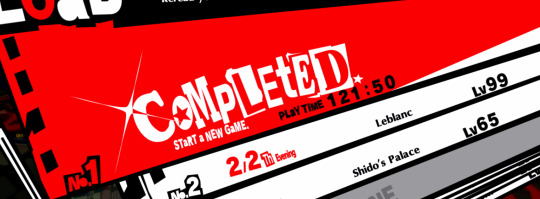
goodbye persona 5 royal. after 121 hours (140 on my switch profile) i got 69% of thieves den achievements, 99% in the compendium, and took 910 switch screenshots (third sem having a recording block really cucked me fr.) I think I did as much as i possibly could. despite my gripes this was my most fulfilling playthrough i've ever done of P5.
i have a lot of bad things to say about royal but i really did have so much fun with it. getting excited over the new moves with the grappling hook (guessing where the cutscene would be and having fun being technical with chains de hook), making more strategic personas with fusion alarms, using all that extra time p5r gives as efficiently as possible. I loved maruki's confidant even if it ended in a kind of mediocre palace. he's just a fun guy who's so naturally inserted into the story it feels like he Should've always been there (except for the end). though its a shame because of how his confidant is structured in terms of topics, you cant easily insert it into p5 (its basically just a huge foreshadowing/ general set-up for the themes of 3rd sem). akechi's though... akechi's confidant and the addition of kichioji was WONDERFUL and i'd have killed for it in vanilla. im so glad for it. its such a fun place to explore and i love all the new npcs; penguin sniper was fun to play (though i hate playing with akechi, esp because its useless to) and jazzjin's gameplay elements were REAL FUN TO MAKE BUSTED ASS TEAMMATES WITH. no more what-ifs is also... a good song. i think i might even add it to my personal faves playlist. i'll have to sit down and listen to the ost when i don't have a headache. anyway there's probably a lot more good things i can say, but my head is kind of muddled rn lol. that post-game feeling fr.
ahh, but even when it comes down to the bad, like kasumi-- groaning every time she came on screen was fun in its own way too; whether it was laughing at the hilarity of it or coming to tumblr and grumbling about it with whoever was following along with my posts that day. honestly i just wish they tried a little harder with her and we got to know *sumire* instead of kasumi a little more. reading the interview where the devs admitted to her just being a marketing ploy and how they treated her as such really is crushing. its kind of a reflection of royal as a whole in a way to me. care *was* put in; i can see the heart behind a lot of this, but it's more focused on being flashy and appealing to those who missed the first wave of p5dom; or trying to draw back in those who have already played. which... is the point of a video game definitive edition, but kind of ironic when presented against the morals p5 seems to stand for. (or tries to, anyway. corporate meddling and cultural norms... this is still a video game that needs to sell.) i know i shouldn't treat silly anime game #685 that lets you date a maid-teacher as an 'art form' but i always felt p5 had a pretty solid and profound message. so to see royal trample p5 vanilla and then dance around wearing its skin is... certainly something. i know they're technically the same game, so royal has those messages too, but they get all tied up in the new stuff that royal brings forth (and doesn't deliver on. lmao. lol) on top of the already shaky at times writing p5 came with. i guess what im just trying to say is that royal's content is good... but it's being too much. and that just makes me really, really sad.
despite all that, royal still kind of rekindled my love for p5 that was already present. every new playthrough for me lets me look deeper into what i like or neat details i missed; seriously i always find something new when i come back to this game. but this was especially true in royal. i found myself noticing when the tiniest detail was changed and it was always fun to compare them, even if it devolved into a tangent.
i really only am disappointed like this just because I love persona 5 as a whole *so much*. its everything to me, so i want it to be the best it can be, yknow?
anyway, thanks persona 5 royal. you've been a journey in multiple ways. try as i might, i won't forget you.
10 notes
·
View notes
Note
v3 ch3
For an ask game.
Ooh, I have a lot of thoughts on v3-3, full spoilers ahead.
Hard mode: Honestly? Contains some of my favorite individual moments in v3. I think there's a reason so many fics take place somewhere during v3-3: you have some intrigue in the student council v rest-of-the-class dynamic, a cast that's lost its most down-to-earth members that helped keep the group as a whole grounded (Kaede may as well have been the class rep; Rantaro, for as little as we see of him he has a knack for getting even the most unruly of the class to calm down; Kirumi was team-mom (with complexity therein, of course, but she deliberately took up the role); Ryoma had this cool-headed temperament that could probably have helped counterbalance some of the emotional highs later in the game) and the reality of their situation is undeniable. Plus, the fact that this chapter had the stones to give Kokichi a concussion and everything the complete lack of response to it means for/around him as a character. That's its own rant, man.
Also Spirit, Praise, and Beauty slaps tbh. I got used to playing videos at 1.5-2x speed, try it with this song it sorta goes from jam to bop imo.
Easy mode: so much missed potential. It’s not exactly a hot take I don’t like what they ultimately did with Kiyo, but v3-3’s single biggest issue for me (besides poor taste) is that it brings up genuinely interesting new territory and proceeds to squander it for shock value.
I’m not the first and won’t be the last to posit 3-3 should have been our first instance of two isolated culprits going off at the same time. I would've loved to see Kiyo survive as just a weird, suspicious but ultimately benign anthropologist, but see. Even with all things as they currently are, someone else killing Angie would have offered us more opportunity to develop the theme of the chapter: ways of coping with grief. (I also really like that this chapter has such a well-defined theme, even if I wish it delivered it differently; the concept offers a lot for character development, and to not commit to taking it is a shame.)
Like, v3-3 gets flack for Tenko's death being nonsensical, but I think it's actually very poignant for those same reasons! Only, unfortunately, a lot of the nuance is left to subtext. Tenko's death has next-to nothing to do with Tenko herself: Himiko almost became the medium, after all, and Kiyo eventually admits any girl besides Maki or Miu would suffice. Her death is all about the elaborate mechanism. It's alarmingly impersonal, tailored to be a chronic killer's magnum opus. How else does one come up with something like the seesaw effect? It's posturing. He was showing off. And Kiyo doesn't exactly have an incredibly macho persona like Kaito, or anything, but that exact kind of insecurity gone out of control resulting in violence against a girl? Is EXACTLY something Tenko would abhor. It adds insult to injury! And if Kiyo hadnt killed Angie incidentally, he'd have gotten away with it. They would have to live with him, and he would have to live with himself and a very visibly grieving Himiko. Holy shit the drama there.
Kiyo did not care about getting caught, at that point. He could probably have gotten away with just killing Angie, honestly, his game-persona was written to have done this sorta thing a lot and the leads weren't clear enough to pin him beyond doubt as culprit without the second crime... but that second crime was important to him. More important than fulfilling his sister's order, more important than seeing another day beyond the game. "It was stupid of him to do!" yes, full of hubris, and-or just not giving a fuck anymore. There's even a moment where he's talking to himself toward the end of the trial where 'sister' chastises him for getting greedy; he knows and does not care. Which becomes even more interesting with what we learn in chapter 6, if we can believe what we're told, and the kids are functionally fabricated before the game... making this probably a case where 'actor does not fit character', so to speak, and the distress and pressure of coercion probably felt real, to him. It's a huge can of worms, and we dwell on none of them. As far as 'chapter 3 breakdowns' go, again wish they didn't feel a need to have one every time, but Kiyos... reads really sad, to me, in a way the previous ones weren't. Minding the subtext of familial abuse and analyzing it, it's just... seriously harrowing. I just really wish DR gave things the gravitas they deserve instead of clocking the audience in the face with them between jokes and telling us to figure it out.
But I've been talking about Kiyo, because the crimes of the chapter really are just about Kiyo. Angie, a character the narrative had been building up to for a chapter plus by that point, is in the wrong place at the wrong time thinking she could easily outwit potential culprits working at night by manipulating the class. Tenko volunteers for what turns out to be a glorified Saw trap (both cruel and ironic!) to spare Himiko the emotional turmoil of potentially not speaking to her late close friend, because Tenko cares so much and so deeply. They're mirrors of one another, in many ways, mind vs. heart, brain v. brawn, etc. through their talents and actions, and it is a damn shame to lose them this unceremoniously.
BUT. Here's the hot take:
That should have been the point.
The narrative should have lingered, through its text, on the tragedy of these two bright girls being slain as an afterthought. Not just as sacrifices for Himiko's development, but as prime examples in how damn cruel the game really is. Angie and Tenko both had trajectories to fulfill, and they did not get to. We don't see the student council again, really; we should. We don't see active mourning (or even struggling not to) for the person who was always eager to lend a hand to everyone else (even the menaces, which was a much better pun than the official translation and significantly less grating) from anyone but Himiko. We don't even do that much with Kokichi calling out Himiko for only starting to visibly give a shit after Angie and Tenko were gone, an incredibly salient point they bring up and just. Don't dig very deep into?? Not that Himiko is an awful character or anything, but the opportunities.
Wish they'd been more tactful, but I honestly kinda like v3-3.
If nothing else we still have seesaw memes, right?
13 notes
·
View notes
Note
1/2 Sorry for the long ass rant in advance!
I need to say something! And I’m sending this to you because you are one of very few people who seem normal and not some lunatic believing just anything! I hate so much how so many people don’t see Harry but only see HS™️ or only see Harry as a walking dick to fulfill their phantasies or project onto him their weird shit! This fandom was always off the rocks when it comes to Harry but it got even more unbearable since this stunt started. On the one side we have those fucking shippers (Holivia, Hamille, larrie, gf shippers in general,…) who live their life through his „relationships“ and making shit up in their head and wank to „boyfriendrry“ 🤐 and on the other side we have the sometimes even more unbearable people who still believe that image that was literally only put out there for marketing of him as a manwhore! 🤮 So many people believe that he’s a „park bench“, fucking anything with a pulse and has sugar daddies all over the world. I‘m sick of even seemingly levelheaded blogs/people turn into completely lunatics. We all know Holivia is fake and just for PR! There’s no need to make shit up about „whorerry“! I know for a fact that most of the shit about him „hooking up left and right“ and „going around the ponds“ is just wishful thinking and hoping from people who either made total shit up about hooking up with him or „having friends/heard he hooked up with someone“ or got rejected by him but couldn’t handle it and spreading shit now. It’s like a bad game of telephone where someone hears something (not necessarily true) and is changing up the story to make it more interesting every time they tell someone. So the story changes over time and gets this big fat lie! For example he’s seen with a friend or whatever (male/female doesn’t matter) and someone sees them and is making up their own little story about what happened, telling their friends who are gonna tell their friends a totally different version. Imagine if you were Harry and people would say stuff like that about you. And this over 12 years now! I can’t imagine how exhausting this is! No wonder he totally quit sm! If I had to see so much shit any time I open any sm app I would have quit as well. I just don’t know why people still don’t know the real harry after all this time? Is it because they don’t want to see it? He always says it himself „anything people say about me is not true“. He’s saying how he likes routine, doesn’t like to party much and is living this live of a health nut (apart from a few questionable eating habits). When he’s working (which tbh he seems now all the time) he goes to bed early and get as much sleep as possible. I know he’s not this innocent little baby and not a virgin but people are so obsessed with his sex life, it’s unreal! When someone suggests that he might not have sex with anyone and maybe even don’t has sex for a few months at a time or more people get violent because they’re reasoning is „he’s hot and young and rich, of course he’s banging all the time“. They do realize that he’s human and he has a free will and is not a sex addict? His stage persona is not the real him?!I‘m so tired of people and questioning if it’s my age (I‘m 30 btw) that makes me see the reality. But then again, there’s so many hags posting disgusting shit about him that it can’t be a age thing. You can find someone attractive without posting every obscene thought you have about them all over the internet! And then not enough that this fandom is totally deranged, no attention seeking locals chiming in there as well! I‘m talking about local gays or desperate groupie wannabes who wish they hooked up with him and now spreading shit all over sm and „confirm“ shit like that „park bench“ bullshit! I sometimes wish I could just quit Harry and sm altogether but then I think, I‘m one of the few people that’s actually there for the music and the real Harry and so I‘m staying a little longer.
THIS!!!!!! I love people who see the real human Harry Styles

25 notes
·
View notes
Note
L please
thank you for the ask!!! i see u in my notifications from time to time so it's nice to hear from you teehee
L - something nice about a character who isn’t a fav
wahhh this is a bit difficult because there are so many characters in bully that i just feel neutral about... so many choices. i guess i'll do a few
i'll start with gary bc he's an obvious one that i don't really care for despite being so popular within the fandom. a lot of people try to redeem him, but i think gary's intense role as an antagonist and the batshit crazy shit he did to fulfill said role was amazing. his actions were absolutely wild and i loved it. it really is a shame he didn't show up more outside of chapter 1, and honestly i wish they went on with the nice guy persona a bit longer before the betrayal. he was a good antagonist, and i don't think he needs to be justified on account of mental illness and stigmatization and bullying. i think we should be allowed to enjoy his character and look down on the parts of him that bully definitely made ehhh decisions with.
and uhhhh i'll do earnest bc no one really likes him lmao. even though earnest was a genuine creep and disguised it under a faux nice guy act that no one actually believed, i think those aspects of his character were done well without trying to justify it. his actions aren't inherently romanticized within the game, it's obvious that they're bad and jimmy even starts working against earnest. as obvious with what i said about gary, i love an antagonistic character that can just be antagonistic without some sob story to back it up. yeah earnest is bullied and tormented for being a nerd, but we don't see a lot of that in game, we just see him be a pussy bitch who makes the most horrible actions and says the most horrible things, and i LOVED being able to beat him the fuck up. in terms of morality, earnest was horrible. but in terms of immorality, earnest was amazing and he made it so easy to hate him. truly phenomenal.
and i'll end it off with hmm good ol johnny vincent. everyone loves johnny, and i am no different. however, aside from my phase at the beginning of my adventure through the bully fandom, johnny isn't exactly a fav of mine lmaooo all respect to people who do love him though. i love johnny's character bc while he’s not really an original concept, he’s a trope i actively enjoy: an overly jealous, emotional, violent, extremely loyal boyfriend whose girlfriend is actively using him and cheating on him... wowie zowie! and i don’t say this to romanticize him bc people within this fandom often glorify his actions because "omg!!!!11!!1!1 a boyf who will fight for me!!1!!1!!!!111!!" but i never found the appeal of such violent jealousy lol. but i think johnny has a great arc coming for him, one where he learns where to dedicate his loyalty, and one where he focuses more on his friends rather than his romance.
thanks for the ask!! <3 it was really fun answering these!!!
#i never thought about how indifferent i feel about most of these characters lmaoo#it was nice visiting my thoughts about them though#thank you#canis canem edit#bully scholarship edition#mine#gary smith#earnest jones#johnny vincent
8 notes
·
View notes
Note
1/2 Sorry for the long ass rant in advance!
I need to say something! And I’m sending this to you because you are one of very few people who seem normal and not some lunatic believing just anything! I hate so much how so many people don’t see Harry but only see HS™️ or only see Harry as a walking dick to fulfill their phantasies or project onto him their weird shit! This fandom was always off the rocks when it comes to Harry but it got even more unbearable since this stunt started. On the one side we have those fucking shippers (Holivia, Hamille, larrie, gf shippers in general,…) who live their life through his „relationships“ and making shit up in their head and wank to „boyfriendrry“ 🤐 and on the other side we have the sometimes even more unbearable people who still believe that image that was literally only put out there for marketing of him as a manwhore! 🤮 So many people believe that he’s a „park bench“, fucking anything with a pulse and has sugar daddies all over the world. I‘m sick of even seemingly levelheaded blogs/people turn into completely lunatics. We all know Holivia is fake and just for PR! There’s no need to make shit up about „whorerry“! I know for a fact that most of the shit about him „hooking up left and right“ and „going around the ponds“ is just wishful thinking and hoping from people who either made total shit up about hooking up with him or „having friends/heard he hooked up with someone“ or got rejected by him but couldn’t handle it and spreading shit now. It’s like a bad game of telephone where someone hears something (not necessarily true) and is changing up the story to make it more interesting every time they tell someone. So the story changes over time and gets this big fat lie! For example he’s seen with a friend or whatever (male/female doesn’t matter) and someone sees them and is making up their own little story about what happened, telling their friends who are gonna tell their friends a totally different version. Imagine if you were Harry and people would say stuff like that about you. And this over 12 years now! I can’t imagine how exhausting this is! No wonder he totally quit sm! If I had to see so much shit any time I open any sm app I would have quit as well. I just don’t know why people still don’t know the real harry after all this time? Is it because they don’t want to see it? He always says it himself „anything people say about me is not true“. He’s saying how he likes routine, doesn’t like to party much and is living this live of a health nut (apart from a few questionable eating habits). When he’s working (which tbh he seems now all the time) he goes to bed early and get as much sleep as possible. I know he’s not this innocent little baby and not a virgin but people are so obsessed with his sex life, it’s unreal! When someone suggests that he might not have sex with anyone and maybe even don’t has sex for a few months at a time or more people get violent because they’re reasoning is „he’s hot and young and rich, of course he’s banging all the time“. They do realize that he’s human and he has a free will and is not a sex addict? His stage persona is not the real him?!I‘m so tired of people and questioning if it’s my age (I‘m 30 btw) that makes me see the reality. But then again, there’s so many hags posting disgusting shit about him that it can’t be a age thing. You can find someone attractive without posting every obscene thought you have about them all over the internet! And then not enough that this fandom is totally deranged, no attention seeking locals chiming in there as well! I‘m talking about local gays or desperate groupie wannabes who wish they hooked up with him and now spreading shit all over sm and „confirm“ shit like that „park bench“ bullshit! I sometimes wish I could just quit Harry and sm altogether but then I think, I‘m one of the few people that’s actually there for the music and the real Harry and so I‘m staying a little longer.
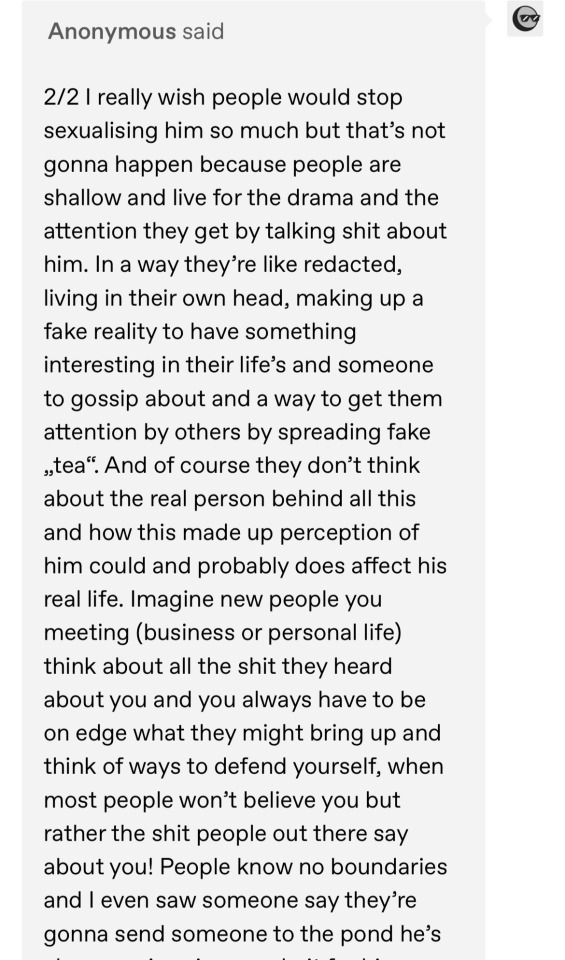

I hate that womanizer image that he’s been stuck with since he was 16. I could be delulu but I just don’t buy it. I don’t think that’s who he is. I’m not saying he’s a saint or that he never has sex but I just don’t think he’s this big man whore either. I think he’s fairly normal for a celebrity and shy/reserved privately, so it doesn’t add up for me. People can think what they want, of course, and they will but I get your frustration.
7 notes
·
View notes
Text
Oh gawd... I saw that argument again...but in another fandom this time!
"Why are you complaining that gay relationship options aren't available with this character? Their canon is to be straight, so just accept it, like in real life, when someone isn't a compatible orientation with you."
My dude…. This is a VIDEO GAME. A FICTIONAL FANTASY FULFILLMENT. The whole point is for the player, whomever that may be, to be able to play at whatever fantasies they want, ESPECIALLY scenarios UNREALISTIC TO REAL LIFE.
Today's rant was inspired by comments I saw on a Fire Emblem post (https://www.tumblr.com/losebetter/186897517231), but I'm bringing back my same argument from when Persona 5 made all the female characters romancable, but none of the male characters, and dudes came out of the fandom woodwork to complain about our complaints that there were no gay romance options:
It's REALLY SUSPICIOUSLY heteronormative, with homophobic implications, if only the straight romance options are available. And it also suspiciously echoes the realistic misogyny, happening everyday AND throughout most of history, if the female cast is treated as this menagerie of options to choose from, like objects on a shelf, all ready and waiting for you, but none (or barely any) of the male cast is.
If you really want to play the "true to real life" card of "each character has a canon orientation and you have to respect that, regardless of whatever fantasies you want to play and expect the game to cater to", then why are ALL the girls available to date? If you want realistic, then some of the girls shouldn't be interested, even if "gloriously irresistible protagonist-kun" chooses them. (jfc As if protag-kun being irresistible to everyone wasn't enough of a hint that the whole point is fantasy/wish fulfillment.) Some of the girls should turn him down because they're lesbians or aroace. Some should turn him down because they've already got a crush on someone else. Some, because they're really just not interested in protag-kun, regardless of having compatible sexual orientations. (BTW Supergiant Games' Hades did this well with Dusa.)
This whole, "we shouldn't get upset that gay romance options aren't available, because that's also how it is in real life sometimes", is RIDICULOUS. It denies that the ENTIRE POINT of videogames, ESPECIALLY OF DATING SIM aspects, are for fantasy fulfillment. Why do only straight guys and occasionally straight girls get their fantasies catered to? Letting games get away with no gay romance options, is just perpetuating queerphobia and heteronormativity. We shouldn't put up with it, ESPECIALLY BECAUSE it's a fictional world, where people CAN make up ANYTHING. So why stay limited, especially to reality?
If you want to advocate for "not enough memory space" or "not enough production time for the studio", then just make a later DLC or alternate version. Like Persona 3 Portable's female protagonist option, to supplement Persona 3's male-only protagonist route. Although, that was 14 years ago. Nowadays, we have things like Assassin's Creed Odyssey, where the gender change is just a skin swap. (Not that AC Odyssey's writing is an example of how to represent queer routes well, from what I've heard.)
#videogames#representation#romance routes#romance options#dating sims#stylishheartthieves#fe3hfuukasetsugetsu#ranting#Atlus won’t let Akira date the boys…UG#lrb~lrt#IntelligentSystems won't let Bereto date the boys...UGH
1 note
·
View note
Note
2, 3, 8, 11, and 23!!! :D
2. Game(s) you’re currently playing
At this exact moment I am playing Yugioh Duel Links, because I have never and probably will never outgrow my yugioh phase and I really enjoy all the silly little character interactions in it. I am kind of playing it as clicker game, as the card game isn't the main draw, but it's fun! One time I dueled an NPC using my Blue Eyes deck as Kaiba and the NPC told me "no fair, I didn't know you had that card" which is the funniest thing to imagine for me. Man who slams his eyes shut the instant anything related to Seto Kaiba happens.
3. 1-3 games you’ve played in the past 12 months that you really enjoyed
I finally got around to playing Hustle Cat after pirating it in 2017, playing exactly one route, and leaving again. I thought the characters were cute and I really enjoyed the world that it created, even if 2017 me had the right idea and Mason was still the best. You have to shout out a dating sim where the wish fulfillment isn't the hot coworkers you can date or even the ability to do magic but the fantasy of getting a job you can enjoy just by walking in and asking for it.
I also really enjoyed Return of the Obra Dinn, though I was a little disappointed at how neatly it all tied together. I spent the first third of the game going "man, this boat sucks," and I wish that had carried through instead of there being one inciting incident. The mystery was really well put together, though.
8. A series you haven’t played but are interested in trying
I've played maybe five minutes of the first Xenoblade Chronicles game but the things I've heard about it are really promising, so I keep meaning to get back to it. Someday I will even learn what they're about.
11. Do you prefer ‘blank slate’ main characters you make yourself or otherwise project onto, or characters with a set personality and backstory?
The thing is that the main characters I like the best are the ones that are blank slates with just enough in-universe justification for it that they end up as characters in their own right. Byleth is one of my favorite characters in three houses, and all four of the modern Persona protagonists rule. I recently saw someone complaining about the Persona 5 anime not giving the protagonist enough of a personality and my first thought was "that's the whole point! he's the wild card, he doesn't express a personality of his own!!" which isn't even really true either but I like the idea.
23. A “Wow” moment of awe
I replayed sdr2 last month and for all that I don't like the characters as much as 1, that ending does rule. It does a really fun job of playing with the medium, especially since none of the characters acknowledge that anything is weird, and then once you the player have more or less figured things out it hits you with the fact that the protagonist doesn't want to cooperate with you anymore. I think that's such a cool way to write a video game.
#ask#non-fantasy#ignore me#thank you! really enjoyed thinking about all this#as much as it pains me to say good things about dangan ronpa in 2023. sometimes those games are really cool
1 note
·
View note